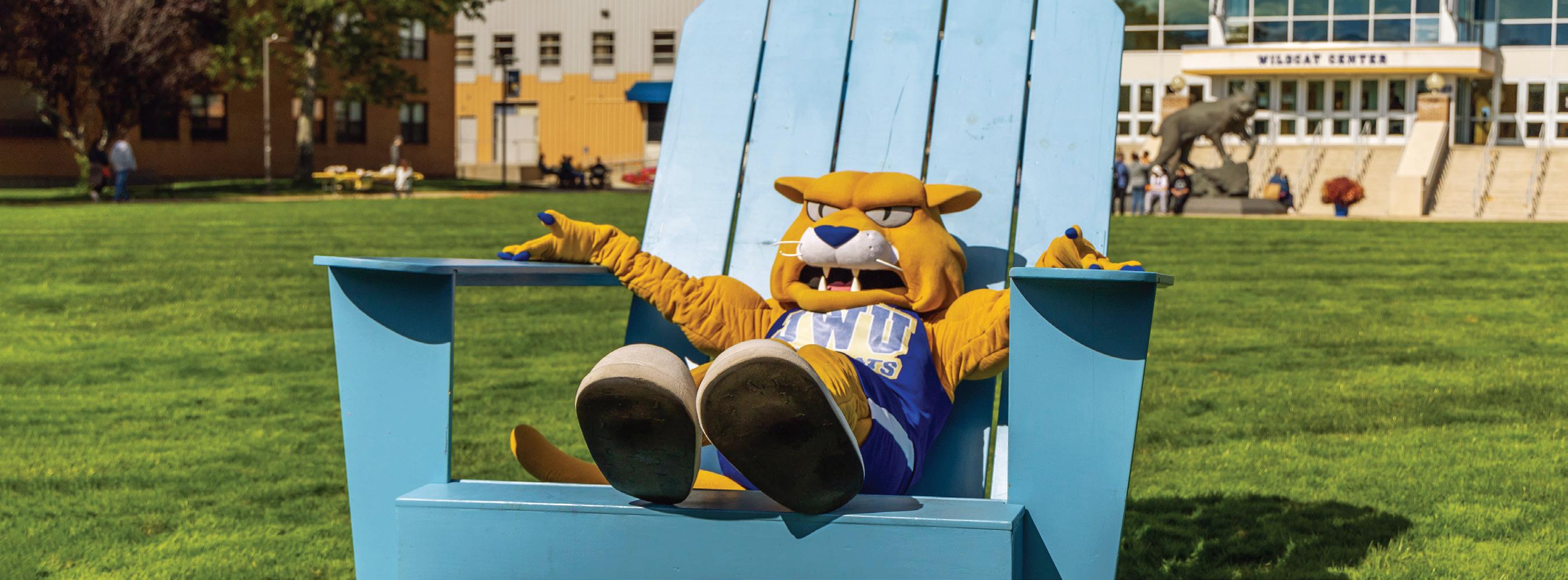











































Award-winning pastry chef Rochelle Cooper ’12 is making her name on the Washington, D.C., dining scene with exquisite, playful desserts and a serious commitment to sustainability and advocacy.
This former Marine and rehabilitation therapy expert is a vital member of the team launching JWU’s new Doctor of Physical Therapy program.
As AI continues to develop at a dizzying pace, Johnson & Wales is grappling with its promise and perils and helping students thrive in a transformed learning landscape.

YOUR NEXT GOOD READ
See what JWU faculty and alumni have published recently in “On the Shelf,” page 27.
COOP-A-CABANA
Meet our new feathered friends on the Harborside Campus, page 36.
TAKE A BITE
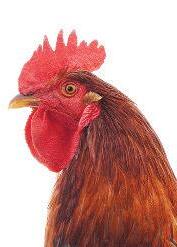

Find out what we learned at FIT Symposium 2025, page 4.
LISTEN UP
Keep up with what’s happening on campus with the “This Week at JWU” podcast. Read more on page 6.
MAKING COLLEGE AFFORDABLE
Learn how the JWU Pledge will help make the dream of a top tier education a reality, page 2.
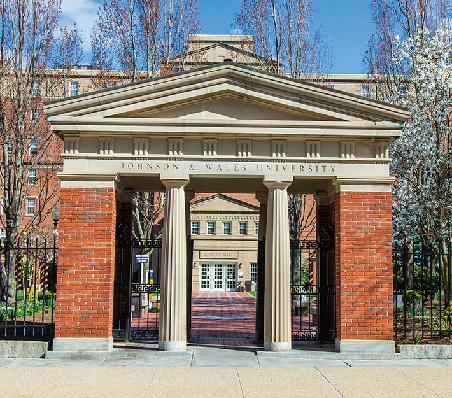
COVER Cover illustration by Alex Nabaum

T JOHNSON & WALES, we are committed to providing our students with accessible and transformative educational opportunities. With that goal in mind, we have recently launched two major initiatives that open new pathways to a JWU education.
In October, we announced that starting this fall, we will offer three-year bachelor’s degree programs in Computer Science, Criminal Justice, Graphic Design and Hospitality Management. I am proud to say we are the first higher education institution in the nation to offer this type of three-year, in-person option.
Designed for students who are eager to begin their career journeys sooner and with less financial burden, these new programs provide a rigorous and comprehensive education in three years instead of the traditional four years. We introduced this streamlined option in response to demand from students and their families and the critical need for high-quality employees shared by our industry partners.
To provide even greater access, we also recently announced the creation of the JWU Pledge, which will make our high-quality, hands-on education more affordable by offering free tuition for qualifying undergraduate students. This new initiative, combined with our three-year degree programs, underscores the university’s ongoing commitment to expanding lifelong access to higher education.
We are also committed to being responsive to the world of work our students will enter. In this issue of JWU Magazine you can learn about how our faculty are preparing students for a world transformed by the rapid acceleration of AI. Our approach is nimble and innovative but also tackles very real questions of responsibility and ethics prompted by this new technology.
In the following pages, we also invite you to meet Associate Professor and Assistant Director of the Doctor of Physical Therapy program Justin Laferrier, Ph.D.—a member of our growing health and wellness faculty and an integral part of the team launching the university’s new doctoral program this spring—and award-winning Washington, D.C., chef Rochelle Cooper ’12, who makes divine desserts and also uses her position to advocate for affordable childcare.
We are deeply inspired by the accomplishments of alums like Rochelle and the many others you can read about in this issue, including Austin Scoles ’18, who is both a Wildcat and an instructor on our Charlotte Campus and recently passed the rigorous exam to become a Certified Master Baker. You continue to amaze us.
With Wildcat pride,

Mim L. Runey, LP.D. Chancellor
Vice President of Marketing & Communications MATTHEW MONTGOMERY
Editor JUDY HILL
Designer BRIAN MURPHY
Contributors
SCOTT BOWERS
JENNIFER BROUILLARD
LYNZI DELUCCIA
KRIS DERAIMO
ALISSA DION
PETE DIVITO
REY LOPEZ
ALEX NABAUM
RACHEL NUNES
CLARA SCHWAGER
KATELYN SILVA
MARIE-INES VALDEPENASA
JWU Magazine is published twice a year. Letters to the editor and story ideas can be sent to JWU Magazine, 8 Abbott Park Place, Providence RI, 02903 or emailed to jwumagazine@jwu.edu.
JWU Magazine is produced by University Marketing & Communications in cooperation with the department of Advancement & Alumni Relations.
Chancellor
MIM L. RUNEY, LP.D.
Campus Presidents
MARIE BERNARDO-SOUSA, LP.D., ’92, PROVIDENCE
RICHARD G. MATHIEU, PH.D., CHARLOTTE
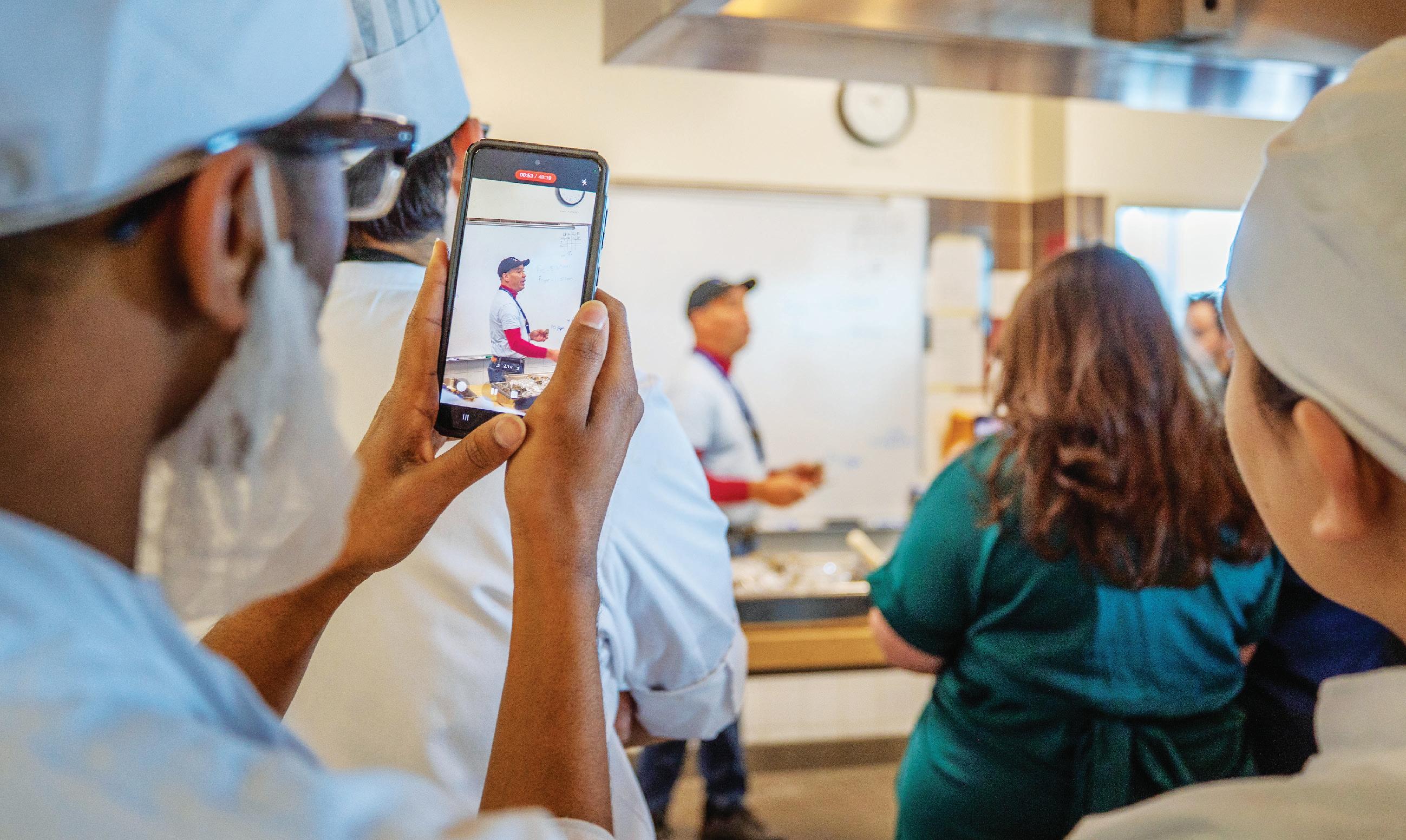
THIS YEAR’S FIT SYMPOSIUM, which took place February 20–21 at the Harborside Campus, focused on the theme of food literacy, a term that, according to “show runner” and culinary instructor Matthew Britt speaks to “all the ways we interact with and understand food and the systems that create it.”
Under that broad umbrella, the two-day symposium introduced an audience of educators, chefs and foodies of every stripe to a compelling cast of presenters all using their stage for a greater cause.
Keynote speaker Marc Vetri, of Vetri Cucina fame, talked about taking food trucks—and food know-how—to the food deserts of inner-city Philly and also about the importance of staying true to his Italian roots and finding ways to bring people together through food. “In the end, what are we actually here for? We’re welcoming folks into our home and we’re making them happy.”
Taylor Hanson, best known as a musician and member of the rock band Hanson, discussed food insecurity in his native Tulsa, Oklahoma, and how the nonprofit he founded, Food on the Move, is working to transform inequitable systems of food production and distribution in that region.
In a session on food as medicine, Brown University medicine professor Bryce Perler, M.D., spoke about the importance—and challenges—of delivering food-centric care and education to his patients and described the partnership that brings Brown medical students to JWU’s campus to learn firsthand about cooking and nutrition from culinary faculty and students.
Panel discussions on sustainable seafood and what’s trending in the food world asked why Americans are not eating a broader variety of fish and seafood and what happens when going viral on Instagram becomes more important to influencers and their audiences than how a dish tastes.
Mixed in with all this serious food for thought, a host of hands-on workshops had attendees shucking oysters, churning ice cream, sipping mead and identifying wild mushrooms, while fans of food media got expert one-on-one instruction on photographing food and pitching winning cookbook concepts.
Turn the page for more tasty tidbits and takeaways from FIT Symposium 2025.
SIXTY PERCENT OF SEAFOOD consumed in the U.S. is tuna, salmon or shrimp. Derek Wagner ’09, ’19 Hon., chef/owner of Nicks on Broadway, champions more sustainable options such as sea robin and dogfish.
CHEWING CHOCOLATE is a big no-no according to Disney confectioner Stefan Riemer. Instead, says the mastermind behind Disney Springs’ Ganachery, press it to the roof of your mouth and let it melt.
FADS COME AND GO—think unicorn toast—but sustainability will continue to be top of mind for food producers, says industry guru Mike Kostyo, because they are “so personally worried” about climate change.
WITH A LENS ON ZERO-WASTE COOKING, CFIT faculty Kelly Fernandes and Tim Brown are using overripe fruits and surplus produce to make creative ice cream flavors, such as dill/blackberry and chocolate/beet.
POST PANDEMIC, says Saveur’s Kat Craddock, wellness travel is less about weight loss and more about “resetting your gut health and sleep cycle.” Other trends? “Functional” foods loaded with probiotics.
EVERY RHODE ISLANDER is entitled to gather a peck of quahogs—that’s 100—per day from local beaches. Chill your ice-covered haul in a perforated tray, says quahogger Jody King. If they sit in water they’ll drown.
FUNGI FACTS: Button, crimini and portobello are all the same mushroom; mushrooms can smell like chlorine, bleach, radishes or raw potatoes; even if a mushroom is toxic, you can touch it with no ill effects.

associate professor megan stoessel’ s students discovered the thrill of seeing their byline in print last semester as part of a Direct Experiential Education (DEE) class that partnered with The Boston Globe
Stoessell, who worked as a lifestyle journalist for the first two decades of her career, tasked her eight students with pitching ideas for two Q&A style articles to Lylah Alphonse, editor of the Globe’s Rhode Island Bureau.
Interview subjects included the co-founder of Providence’s popular Nitro Bar and a JWU alum who started a restaurant in Fall River. Through the project the students honed their interviewing and reporting skills before writing up the articles, which ran on the Boston Globe website.
Molly Harris ’25, who has since started an internship with Rhode Island Monthly, says the part she enjoyed most was the interview process. “We worked on writing the interview questions together in our mock newsroom and then went out on our own to make the connections and conduct the interviews,” says Harris. “As an introvert, learning the polite persistence it takes to be a real journalist was eye opening and challenging, but was also something I found I was really good at.”
“This is me leveraging my connections and resources, getting to pay it forward,” says Stoessell of the class. “People helped me along the way, and now I’m helping open a door for my students. They all left the DEE with published clips in hand, and that’s a rarity in the college world.”
major: Dietetics and Applied Nutrition
Presidential Scholarship recipient hometown: Valdosta, Georgia
why did you choose jwu?
Ever since I was born, I’ve always been in the kitchen. I remember cooking with my grandma, my mom, my aunties, sneaking behind them, tasting the food, making sure it had the right seasonings. When I was 9 years old, I decided I wanted to be a private chef for athletes, so I looked up top culinary schools. Johnson & Wales just stood out.
why nutrition and dietetics?
Four or five years ago, I had a medical emergency and I began a weight loss journey. But doing that made me lose my spark for cooking. I had to slowly regain it through healthy habits, healthy eating. During my weight loss journey I worked with a registered dietitian who influenced my interest in dietetics. I’ve always loved sports, so I did some research and decided I want to be a sports dietitian for college athletes.
how has it been so far?
Being in Providence makes me realize how much I miss my parents, my brother and my family. I miss Southern hospitality and the foods. I am enjoying the North, though. I enjoy the weather, nature and culture. And I love seeing the diversity of Providence. I didn’t expect it to be this diverse. My classes have been great throughout. The teachers are passionate, and they care, and I learn best when a teacher cares.
favorite class?
Voice to Power, an honors class with Jesi Harpin, was the best class I’ve ever had in my life. It was a group discussion on topics such as rights and voting and that class challenged me and broadened my range of how to speak and articulate, which I really love.
what do you do outside of class?
The Black Student Alliance has been great for me. I’m from a majority Black high school so I wanted to find people who can relate and understand my cultural challenges. I’m the freshman representative and I want to grow that program. what are you looking forward to?
I want to continue to grow academically, personally and mentally. That’s what I’m looking forward to the most, learning about myself through my experience here at Johnson & Wales.

“I was making some Mediterranean food the other night, and instead of using lamb or beef, I ended up just doing roasted chickpeas as the main protein source.”
Jonathan Poyourow, Ph.D. Associate Professor, on “Marketplace,” on using less meat in his cooking because of high food prices.
“A lot of police departments lack the resources to do things like this, and I say let’s keep working together to keep trying and let’s do our best to solve crime.”
Doug Tondreau Associate Professor, on NBC10, on JWU offering free cybersecurity training to New England law enforcement officers.
“Our students complete all of their clinical rotations in Rhode Island. Most graduates from the inaugural class intend to work in Rhode Island health care settings.”
Kiley Medeiros, Ph.D. Nursing Program Director, on Providence Business News, about the rise in demand for accelerated nursing programs.
“A lot of the contestants on the show worked with fondant and did a lot of hyper-realism, which I never do. I will make my creations aesthetically pleasing, but delicious to eat.”
Jennifer Lee ’25 in The Boston Globe, on appearing as the youngest contestant on Hulu baking show “Cookie Cupcake Cake.”
when lynzi deluccia took the reins as JWU internal communications manager four years ago, she drew on her background in broadcast journalism to find new ways to tell the JWU story.
As well as starting a weekly digital newsletter, DeLuccia leveraged expertise from her onscreen career to introduce more visual storytelling. She knew she wanted to start a podcast, though, and JWU’s Center for Media Production had what she needed to get it off the ground.
“I figured we have the stories here to tell. We have the facilities to be able to tell them. Let’s utilize it,” says DeLuccia. The first “This Week at JWU” podcast aired in October 2022 and since then a new one has landed every week school is in session, with a speedy roundup of need-to-know campus news followed by a one-on-one conversation.

“I get to have a lot of fun with that portion,” says DeLuccia. “I might be interviewing a faculty member who’s doing awesome research or a staff member who has a great story, but we’ve also had some of our highest listenership on episodes with students.”
Recently, DeLuccia interviewed a student who came to JWU from Iran after meeting a faculty member at a culinary competition overseas. “It was a great story about both a really ambitious student and a hardworking and dedicated faculty member,” she says.
Other stories that have gained traction include an interview with longtime wrestling coach Lonnie Morris and a podcast with George Ortiz Jr. ’23, founder of the Elisha Project. “The more I do these interviews,” says DeLuccia, “the more I learn about the ties people have to Johnson & Wales that have shaped their narrative.”
Media Communications students have assisted DeLuccia with the podcast since the beginning, and she would like to see it shift toward being more of a student-led project. “I’d like to help them build their craft because we have so many students who are interested in podcasting,” she says. “Down the road I would love to see more students involved in this, sharing our stories through this medium.”
CATCH UP WITH THE LATEST EPISODE OF “THIS WEEK AT JWU” ON APPLE PODCASTS.
“I
picked JWU’s three-year
program because I wanted to finish school faster and start working sooner. The best part is that I still get hands-on experience and internship opportunities, even with the fast pace. It’s the perfect mix of speed and real-life experience.”
— Soon-to-be Wildcat Janay Newton, who will join JWU this fall in the new three-year bachelor’s degree program in Criminal Justice
The JWU Providence women’s basketball team wrapped up an extraordinary year with a 23-3 record and a first-place finish in the Great Northeast Athletic Conference (GNAC). Head coach Dino Porcic, who was named GNAC Coach of the Year, guided his team to the second-highest win total in program history and a spot in the conference semifinals. Freshman Grace Jaffray was named GNAC Rookie of the Year after ranking among the top five scorers in the nation.
The JWU Charlotte women’s basketball team, coached by Jill Dunn, advanced to the USCAA Division II National Championship, where they were knocked off in the semifinals to eventual champion Christendom. Senior Jordan Durant was named a USCAA First Team All-American for the third-consecutive year.
Grace Jaffray
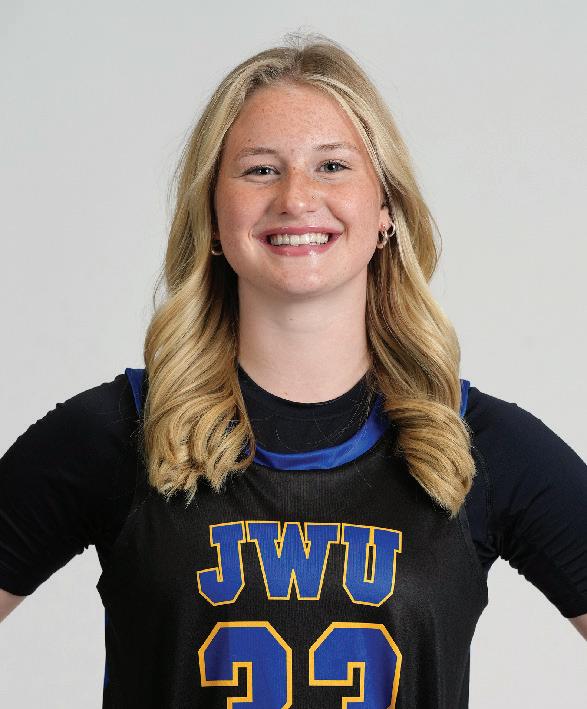
JWU Providence Director of Athletics Dana Garfield was inducted into the University of South Carolina Lettermen’s Association Hall of Fame. A four-time National Fastpitch Coaches Association (NFCA) All-Region selection, Garfield is one of 12 players in program history with 100 runs and 100 RBI.
The National Collegiate Athletic Association (NCAA) has accepted JWU Charlotte as a provisional member in Division III beginning September 1, 2025 when they will compete in the Coast-To-Coast Conference. Upon successful completion of the provisional process, it will become a full Division III member for the 2028–29 academic year.
The Johnson & Wales University wrestling team captured the 2025 Division III Wrestling National Championship in its home state of Rhode Island on Saturday, March 15. The Wildcats—who placed third in 2019 and fourth in 2024—became the first program at the university to win a Division III title.
The championship marked the pinnacle of Lonnie Morris’ long, illustrious career as head coach. A former All-American wrestler at Rhode Island College, Morris is the only head coach the JWU program has ever known. Beginning with just four student-athletes in his inaugural season of 1997–98, Morris now annually carries a roster of between 40 and 50 students ranging from all-state performers in high school to local kids who are the first in their family to attend college.
Since the program’s inception, Morris and associate head coach Brian Allen—who joined two years after Morris, in 1999—have produced 59 All-Americans and eight national champions. This year, the Wildcats had two All-Americans for the first time in program history: Seniors Joziah Fry (125 lbs.) and Hayden Brown (149 lbs.).

JWU began its run through the national tournament on Friday, March 14 with seven student-athletes, four of whom advanced to compete on day two: Fry, Brown, senior Dylan Harr (197 lbs.) and junior Adolfo Betancur (285 lbs.). After securing All-America honors on Friday, both Harr (fifth place) and Betancur (sixth place) secured crucial points in the wrestleback (consolation round) on Saturday to give their teammates a chance to capture the chip later that evening.
Brown did his part in the third match by defeating the No. 2 seed with a 5-0 decision, which then gave Fry—a native of Coventry, Rhode Island—the chance to ‘walk-it-off’ for the Wildcats. Despite falling behind early, Fry rallied for a 10-5 win—the 121st of his career—and electrified the crowd.
Finally, after more than 450 career wins, the high school principal turned wrestling head coach had his elusive national title.
Morris called hosting the national championship a “bucket list” item and he feels confident that his program has, once and for all, permanently stamped its name amongst the elite teams in Division III. “When we first started, no one knew what JWU was, so our saying was always ‘J-who? J-WOOO!’ Now, everyone knows it stands for Johnson & Wales University.” — PETE DIVITO

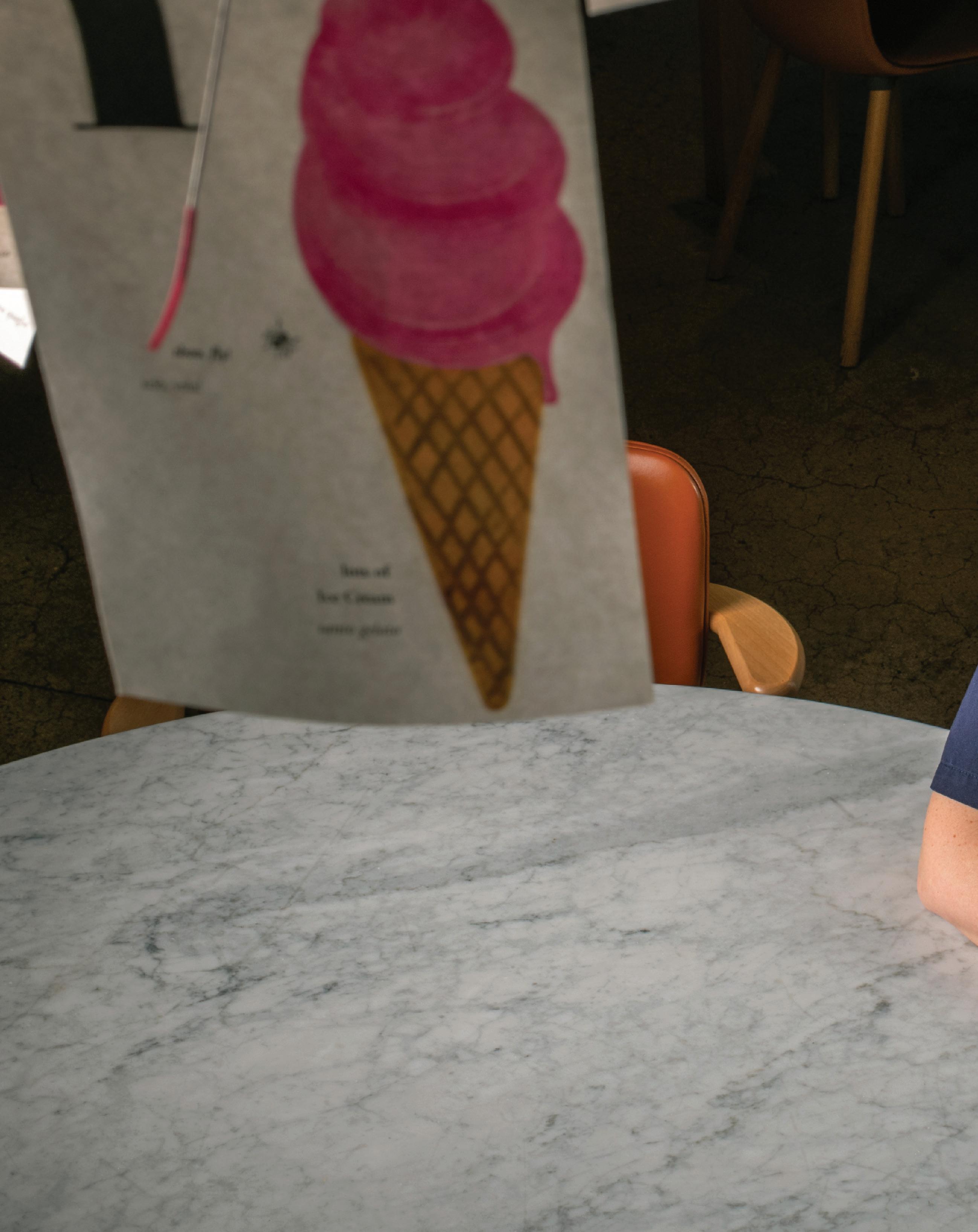
Award-winning pastry chef Rochelle Cooper ’12 is making her name on the Washington, D.C., dining scene with exquisite, playful desserts and a serious commitment to sustainability and advocacy.
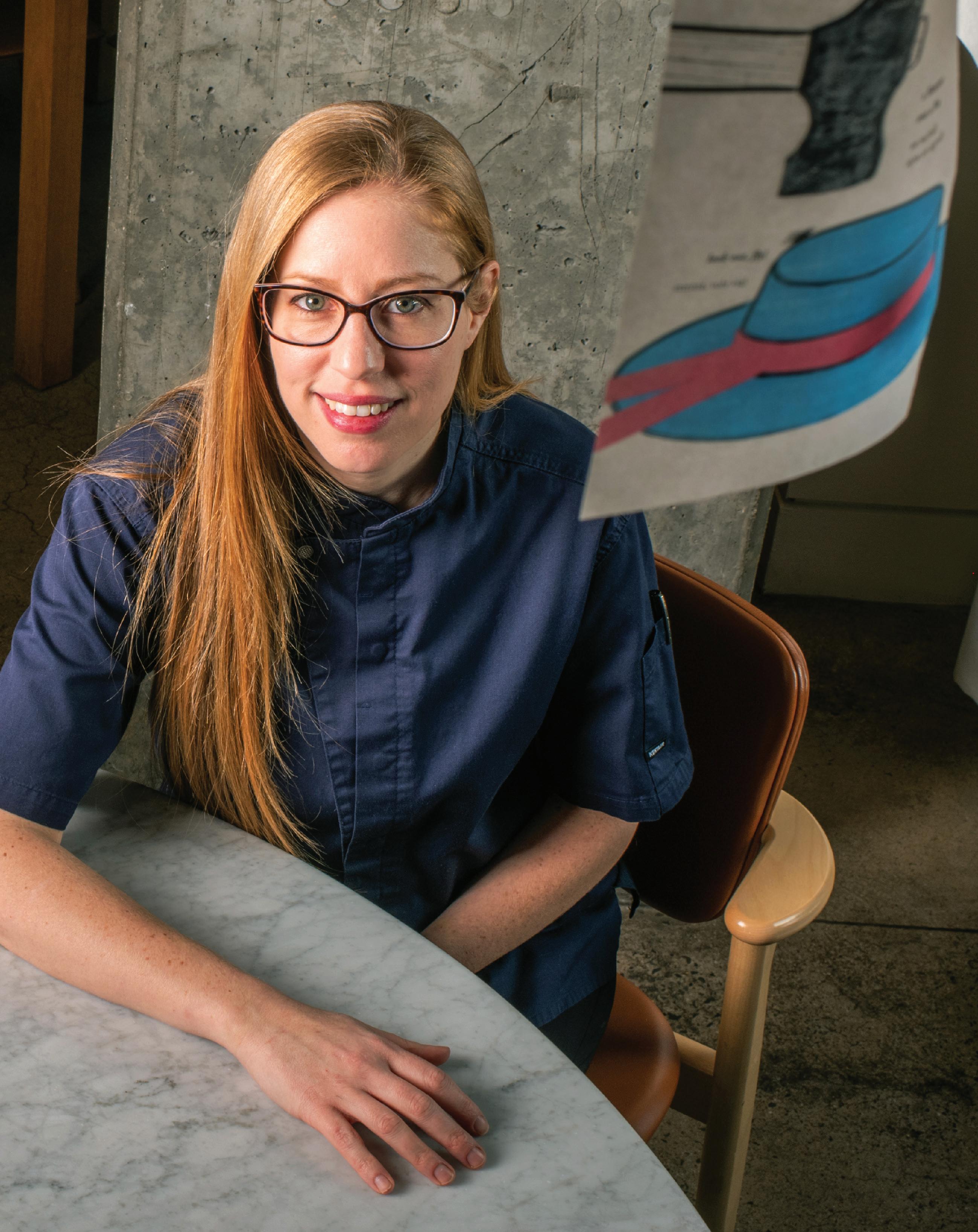
AT THE DUCK & THE PEACH’S Sunday brunch in Washington, D.C.’s Capitol Hill neighborhood, patrons are greeted with a basket of four homemade pastries. On a recent Sunday, the basket featured a maple walnut scone, a Nutella croissant, a honey cornbread muffin made with flour from a local farm and a signature cinnamon roll with a citrus lemon cream cheese frosting. Head pastry chef Rochelle Cooper ’12 chooses many of her ingredients with sustainability in mind, ensuring that extra ingredients from the week before are used in delicious new manifestations.
“I enjoy creating a full sensory experience while making sure nothing in the kitchen goes to waste,” says Cooper, who won the RAMMY Pastry Chef of the Year award in 2024 for her work at the restaurant. “I like playing with flavors, delighting diners with fun concepts and harkening back to desserts that make me nostalgic, like a twist on s’mores or incorporating the classic Ferrero Rocher candy into a new dessert concept, which I call the Ferrero Rochelle.”
While Cooper enjoys whipping up new bakery items every weekend, she’s most renowned for her high-concept plated desserts, which are featured not only at The Duck & The Peach, but also at two other Washington, D.C. restaurants—La Collina and The Wells—that are part of the Eastern Point Collective. A team of hospitality innovators led by executive chef Katarina Petonito, the collective prioritizes delicious food but also work-life balance, sustainability and culinary collaboration, all values dear to Cooper’s heart.
craft through collaboration
Celebrated among her peers in the district and beyond, Cooper didn’t become an award-winning pastry chef overnight. While she had a foundation of making magic in the kitchen with her mother as a child in Bucks County, Pennsylvania, it was during her time in Johnson & Wales’s Baking & Pastry Arts program that she homed in on what kind of chef she wanted to be.
Originally, Cooper dreamed of opening a bakery, but once she began taking classes at Johnson & Wales centered on plated desserts, she became passionate about becoming a restaurant pastry chef. Classes she found particularly impactful included Neoclassical Desserts (modern takes on traditional offerings with Senior Instructor Christina Harvey) and Sensory Analysis of Contemporary Plated Desserts with Associate Instructor Mark Soliday.
She says, “I fell in love with the plated aspect of desserts—the flavors, the experiences, balancing temperatures, all that stuff. I forgot all about the bakery after that exposure.”
Cooper’s professors remember her as an especially enthusiastic and committed student who was eager to soak up as much knowledge and craft as possible. Soliday says she was “one of those rare individuals that quickly learned how beneficial it could be to interact with your chefs and pull as much information from them as possible.”
That appreciation for elevating one’s craft through collaboration continues in Cooper’s kitchen today. While she is the head pastry chef, she doesn’t make decisions alone. Ideas about flavors and ingredients to feature each week are a team effort, she says, and made with an eye toward beautiful presentation, harmonious flavors and using extra ingredients from other dishes in new ways in her desserts, pastries or pop-up ice cream shop.
The Ice Cream Shoppe-up, as it’s been affectionately named, came to fruition during the COVID-19 pandemic when in-person dining was stalled. Cooper had the idea to start a pop-up for unusual, original ice cream flavors that people could take home by the 26 ounces. Every flavor is inspired by an excess ingredient not fully used in the kitchen or at the bar. An example is her “Gimme S’more” flavor that utilizes the ingredients from her s’more-inspired dessert.
“ We give each other feedback and together we get our dishes to an even better place. Our sous chefs and cooks—really everyone—have input.”
“When I have excess mise en place from special orders of that dessert, I turn it into a graham cracker ice cream swirled with marshmallow and chocolate fudge and sometimes smoked chocolate graham cracker pieces,” says Cooper who credits the rest of the team for the inspiration of ingredients to use for her specialty flavors from all over the kitchen. That kind of collaboration is one of the key reasons Cooper says she loves being a chef with the Eastern Point Collective.
She explains, “I collaborate closely with our executive chef on everything I do. We’re tasting things together, both savory and sweet. We give each other feedback and together we get our dishes to an even better place. Our sous chefs and cooks—really everyone—have input.”
Chef Petonito agrees. “Rochelle’s ability to collaborate with the team allows her desserts to be ever evolutionary. If someone suggests mixing something one minute more or adding an additional 10g of something she is always willing to give it a try. Her desserts are continuously improving because of that openness.”
Cooper’s openness to new approaches and ideas was evident during her days at Johnson & Wales, says Soliday. He remembers Cooper as “one of my most curious students, who loved being challenged, always asking what could be done better or how to get more flavor forward.” He adds, “In my plated dessert lab, I knew stepping up to Rochelle’s table that my palette was in for a treat. My eyes would be looking at a solid plate design and my mind would have an intellectual discussion about the guest perception.”
Soliday’s assessment of his former student’s desserts still rings true. Cooper’s attention to flavors and a playful presentation is perhaps best exemplified these days by her favorite The Duck & The Peach dessert, a lemon latte pavlova. Her elegant yet fun take on the pavlova “plays up the acidity of espresso,” she says, and presents like “an elegant snowball” that patrons can break open with their fork to reveal a confection of sharp lemon meringue, chocolate sponge cake, espresso cremeaux and vanilla bean mousse.
“I love this dessert because it’s a sensory experience. It’s not just balanced with flavor, it’s also balanced with texture, and it looks very elegant when it comes to the table. It’s this beautiful sphere with these dancing ingredients on a clean, big plate. And then the server tells you, ‘Okay, you can break it.’ It’s fun.”
That kind of whimsy and charm comes as no surprise to Associate Professor Richard Miscovich, who taught Cooper in a bread baking class at JWU. He says Cooper’s “enthusiasm and zest for life is clearly visible in her products that bring together delicious and interesting sweet and savory flavors.”
In addition to her coursework, Cooper says the three internships she undertook also shaped her as a chef. The first, where she underwent a “steep learning curve” at the five-star French restaurant Le Bec Fin by Georges Perrier in Philadelphia, was followed by a summer at the Hotel
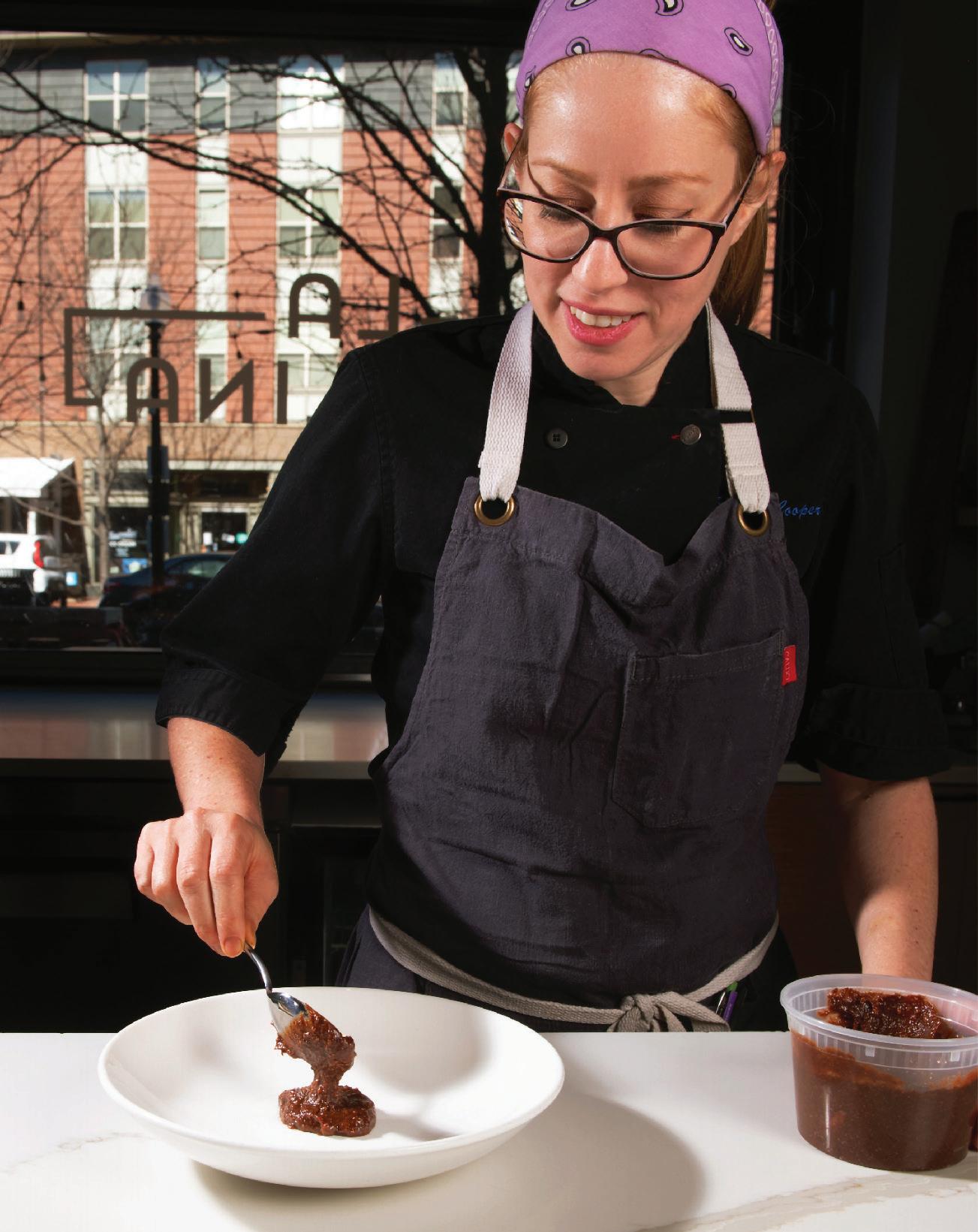




After being nominated three times, Rochelle Cooper won the prestigious RAMMY
“I am fortunate to work with a group of women leaders—many of whom are mothers as well—and this has allowed all of us to be there for each other and have unmatched empathy in the workplace.”
Hershey in Hershey, Pennsylvania, where she learned about everything chocolate. Perhaps most impactful, though, was her study abroad program internship at Cuisinart Resort in Anguilla where she had the opportunity to shape her own dessert menu.
The resort had a number of different restaurants on site, and Cooper was particularly drawn to a Japanese restaurant that had a “boring” dessert menu that was not selling well. “The chef asked for my advice, so I really took the opportunity and ran with it, creating a whole new Asian-fusion dessert menu that included a passion fruit chocolate sushi dessert that I cut and styled to look like a sushi entrée. I put some red and gold pearls on it to be reminiscent of tobiko, with a pomegranate jelly instead of the pink pickled ginger, and then I did something with green tea for the wasabi.” After her internship was completed, the chef continued to reach out to her for tips on the dessert menu.
On graduating from JWU in 2012, Cooper pursued a one-year master’s degree in education at Pennsylvania State University before embarking on her career in the restaurant world. She spent a year as a pastry cook at the Eau Palm Beach Resort & Spa before moving to Washington, D.C., where she started working at Range by Bryan Voltaggio under the renowned pastry chef Chris Ford. After that, she moved on to the
two-Michelin-starred Minibar, where she worked for Chef José Andrés, for whom she went on to become a research and development chef. She joined the Eastern Point Collective in 2021.
“Every step along my journey, from my education to each kitchen, helped shape the chef I am today,” says Cooper.
community focused
Cooper’s openness, ingenuity and artistry earned her the prestigious RAMMY award for Pastry Chef of the Year in 2024. The awards are presented by the Restaurant Association Metropolitan Washington to honor the ability and accomplishments of the region’s restaurant and food service community and awardees are selected by a panel of anonymous judges.
“When I came to D.C. and first heard about the RAMMY awards, people talked about them like they were the Grammys for D.C. food and restaurant people. I always thought that to be invited to the gala event would be insane, never mind being nominated for an award,” says Cooper, who has now been nominated three times, winning this past year.
As well as being a celebration of her achievements as a pastry chef, Cooper saw her RAMMY award as a chance to raise awareness about an issue of importance to her and many in the restaurant industry: work-family support and balance. She used her acceptance speech to talk about how the industry can work together to find practical and affordable solutions to support those in the industry with families.
During her speech, she asked the audience some pointed questions, “How many of your cooks have two jobs? How many of your team members need to lose a day of pay to be home with a sick child? How many are unable to take the parental leave they need?”
As she watched members of the audience nod in agreement, she was gratified that the message resonated and “grateful” she hadn’t won the RAMMY the first two times. “I’m glad it took some time to win because I’ve been coming into my own,” she says. “I became a mom. I grew a lot and I’m really glad I was able to use that platform to advocate for national paid family leave and affordable childcare—especially for our industry, where these issues are particularly challenging.”
Being a woman in a historically male-dominated industry has its challenges, says Cooper, though she sees improvements as more women rise to leadership roles. “Beyond culture, the biggest barrier to the rise of women in fine dining is accessible and affordable childcare,” she says. “Fine dining hours are grueling and often carry a schedule that goes into the evening hours when daycares aren’t operating. Our country is incredibly behind on this. Luckily, in my current role, I am fortunate to work with a group of women leaders—many of whom are mothers as well—and this has allowed all of us to be there for each other and have unmatched empathy in the workplace.”
Another area where Cooper uses her industry bona fides to help raise awareness, and in this case, funding, for an important cause is through an annual cookie swap that she spearheaded with a group of pastry chefs and food writers called the Cookie Kindness Project. The first cookie box sale was inspired by the reversal of Roe v. Wade and raised over $12,000 for DC Abortion Fund and Planned Parenthood. Now, the group holds approximately four sales annually in addition to a yearly holiday cookie exchange. They have raised almost $50,000 for an array of local causes and non-profits, including Safe Shores DC, Kid Power DC and A Wider Circle.
Cooper’s commitment to bettering her community and the world around her through civic engagement and delightful plated desserts comes as no surprise to those who know her best. Her executive chef, Petonito, says, “If I had to use one word to describe Rochelle, it would be light. I find her to be a beacon of joy and positivity, always available to help our team and others and never thinking only of herself.” JWU
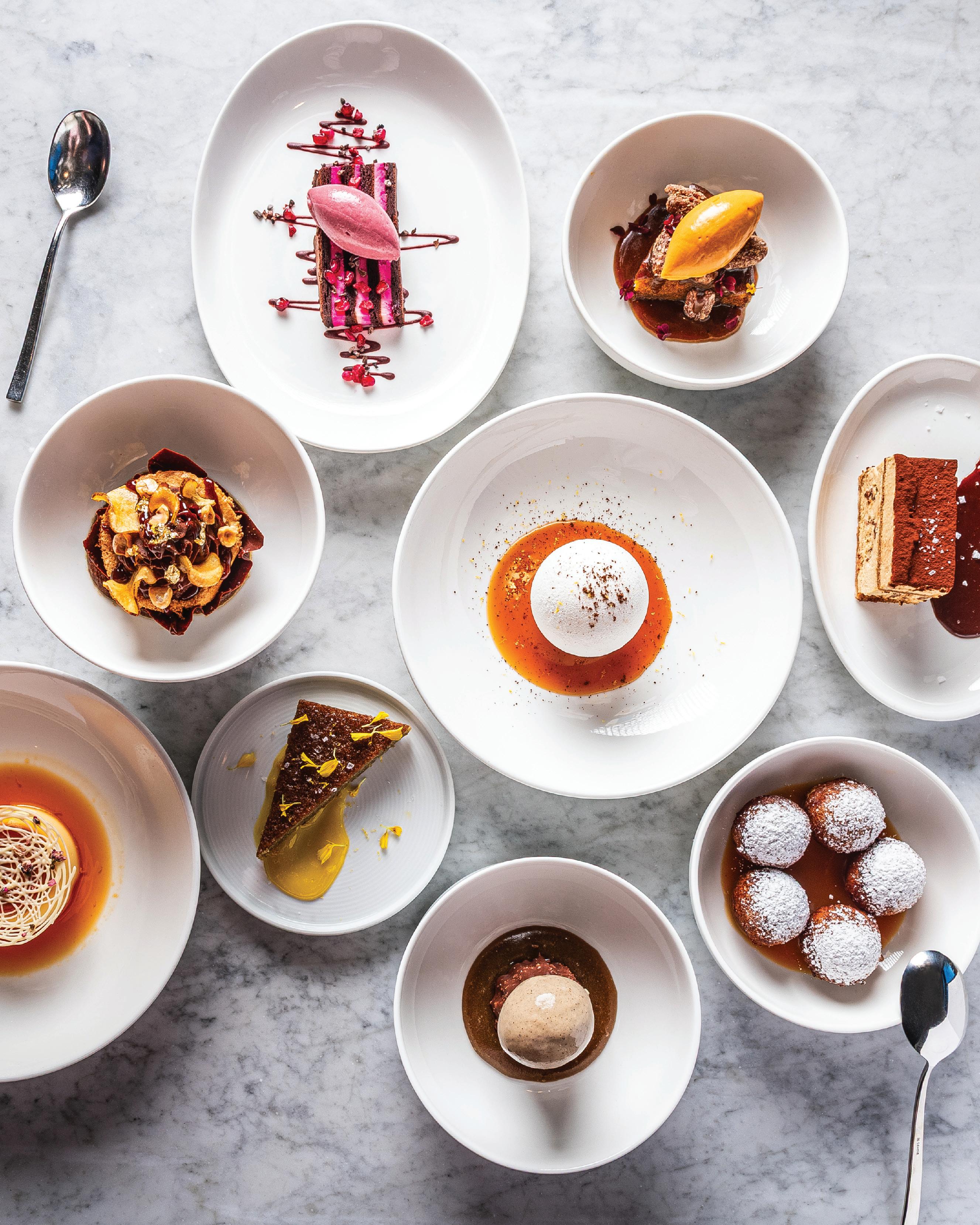
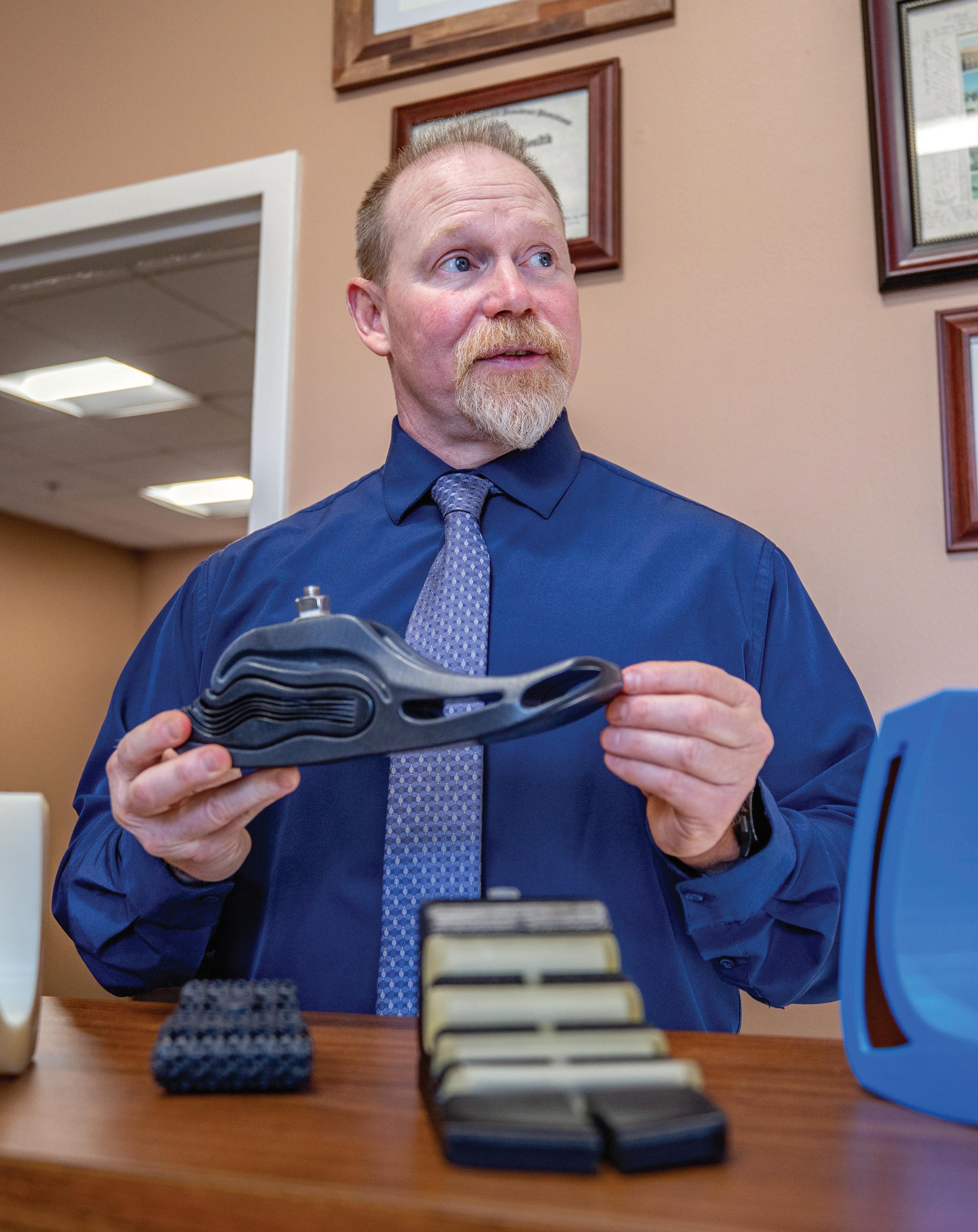
This former Marine and rehabilitation therapy expert is a vital member of the team launching JWU’s new Doctor of Physical Therapy program.
AsJohnson & Wales prepares to welcome its first cohort of physical therapy doctoral students on June 2, the faculty is hard at work putting the final polish on a program that promises to be rich in clinical experience and interdisciplinary opportunities.
Associate Professor Justin Laferrier, Ph.D., the third member of the team to be recruited, is celebrated in his field for groundbreaking work in polytrauma rehabilitation, adaptive sports and mobility related assistive technology, especially prosthetics.
A self-described “rambunctious kid” who grew up in Burrillville, Rhode Island, and joined the Marine Corps right out of high school, Laferrier found his calling in college, embarking on a career that would take him around the world to places including the nation’s capital, Iraq and Texas before returning to New England to bring his clinical experience to an academic setting.
We sat down with Laferrier, who is associate director of the DPT program, to talk about his singular journey to JWU.
What made you want to be a physical therapist?
Justin Laferrier: I was a three-sport high school athlete and when I was in college I played football for the
University of Rhode Island and got hurt here and there. I went to see a PT and had a good experience. I also had friends I trusted that were going into physical therapy and were excited about it, so I started seriously considering it. At that time, you could be a PT with a master’s degree [a doctoral degree is now required], and URI had a great program.
Was there an area you were particularly interested in?
Since I was an athlete (albeit not a great one), I thought I’d probably go into sports medicine. I think a lot of people get into physical therapy that way. I figured I would work with athletes. And I knew I’d be working with a lot of orthopedic injuries in the military.
After I graduated from PT school I went back into the Army and was stationed at Walter Reed Army Medical Center doing sports medicine and manual therapy and orthopedics, just like I thought I would. Everything was working out.
And then we got four patients with amputations and my superiors asked me if I could get them back to an active lifestyle, back to sports, exercise, recreation. I said, “Well, I’ll give it a shot.” I really didn’t have any experience with this population, but I figured I’d learn.
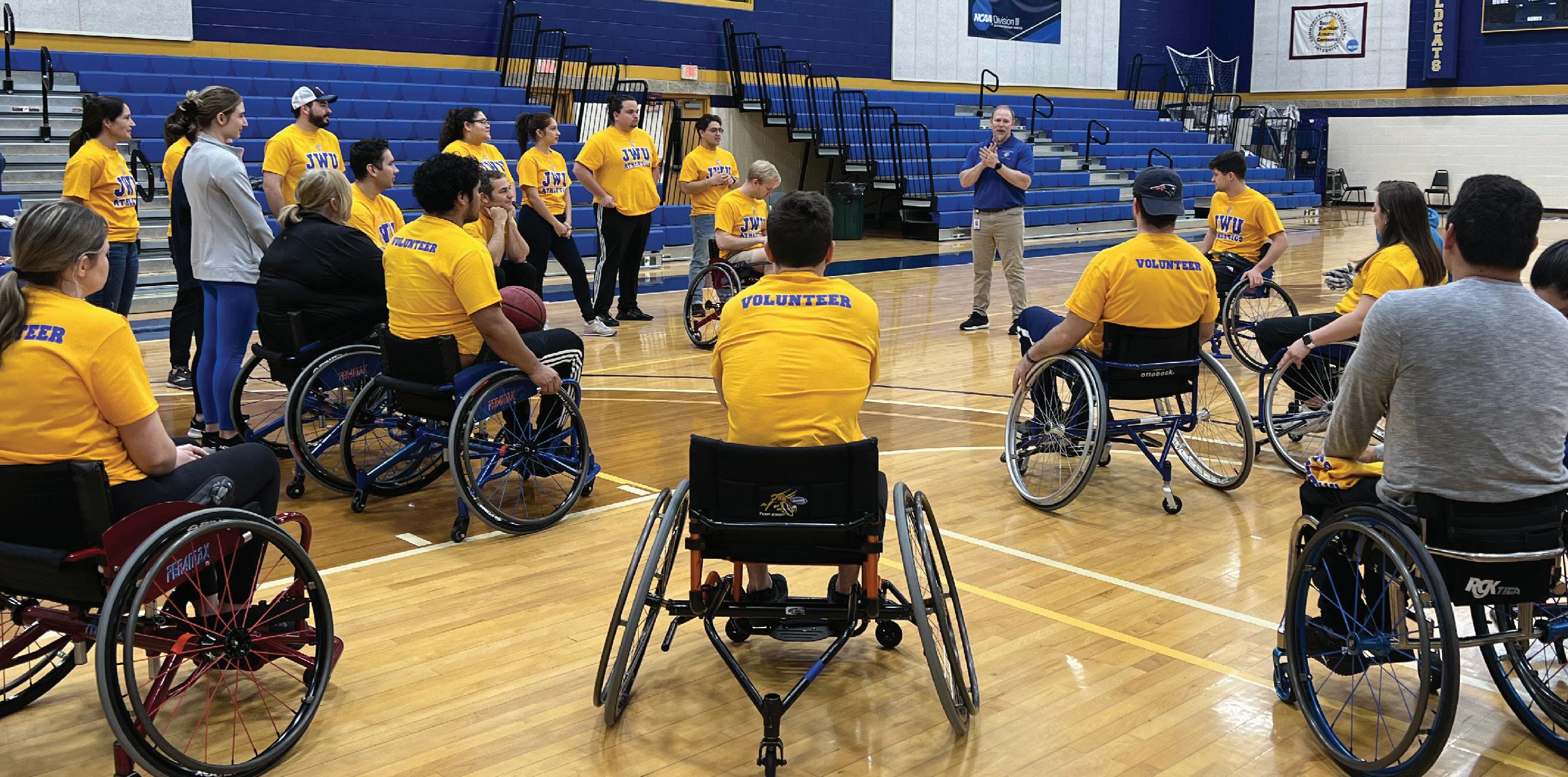
I did a lot of on-the-job training and searched out mentorship in all the different fields and applied a modified sports medicine model to a military population with horrific injuries. The base general and the steering committee for the hospital had their doubts. They brought me in and said, “You can’t do this. You’re going to hurt these people.” I said, “Do you really think we’re going to hurt them worse than they’ve been hurt already, or does this give us the best opportunity to bring them back to full function and back into the community—back to duty, back to work, back to family?”
They told me I couldn’t do it, so I did it anyway and it worked out very well, with much better outcomes than in the past. And then the Iraq War really kicked off and they put me in charge of physical therapy for polytrauma and amputation physical therapy.
What exactly is polytrauma therapy?
Polytrauma physical therapy is where you see the worst injuries that you’ll ever see. Patients have spinal cord injuries, traumatic brain injuries, burns and a multitude of other injuries/conditions, often at the same time.
You have to use your whole toolbox of skills to see how you’re going to triage and treat these individuals (which all PTs should do anyway), but as a young physical therapist it really forced me to think about all the systems, internal and external, that might be affected in a patient. That led me to obtain multiple specialty certifications including neurologic, orthopedic, sports, vestibular rehabilitation and assistive technology as I tried to better serve my patients.
After that you did a tour in Iraq.
Yes, I ran a clinic at Ibn Sina in Baghdad. Different units would ask if I could go out with them into the field because
it was easier for me to treat their folks on the other side of the fence than it was to get them into the hospital.
So, I would go out with a Navy SEAL team, a British SAS team, a Green Beret unit. We had to run it up the chain of command, but I was all for it. I was also tasked to go to different regions to evaluate Iraqi patients with amputations, which allowed me to work with some great people and organizations from multiple countries.
What came next, on your return?
When I came back, the military asked me to assist in starting what became the Center for the Intrepid in San Antonio, Texas. The CFI is an impressive 65,000-squarefoot building that focuses on rehabilitation and functional capacity evaluations to get individuals with polytrauma, including amputations and burns, back to duty and life.
They have incredible facilities, including the CAREN system, which is a computer-assisted rehabilitation environment inside a 360-degree geodesic dome where you can do fully immersive virtual reality rehabilitation and research studies. We were all working seven days a week, 12, 14 hours a day, because it was wartime. There were days I slept at the clinic just to beat the morning traffic.
You went on to earn a Ph.D. in rehabilitation science and technology and to teach at URI, where you started an adaptive sports program. When you joined the JWU faculty you brought that program here I had developed an adaptive sports program for disabled service members and their families when I was working at Walter Reed. It was the first one of its kind in the military for that war era.
I say for that war era because adaptive sports actually began during World War II, when a neurosurgeon named Sir Ludwig Guttmann, who had gotten out of Germany
right before the war, started the first spinal cord injury center at the Stoke Mandeville Hospital in England. The adaptive sports program he created for pilots with spinal cord injuries developed into the annual Stoke Mandeville Games, which eventually became the Paralympics.
When we set up our adaptive sports program, I had people tell me that if they hadn’t gone through our program, they wouldn’t have made it, so it was very rewarding.
At URI I was motivated to launch another adaptive sports program because Rhode Island has about 117,000 individuals that identify as having a disability and there wasn’t a ton of adaptive sport exercise and recreation here. I started a program with the students at URI and brought it to JWU as part of an Occupational Therapy capstone project when I accepted the faculty position here.
We’ve already had a few adaptive sports events at wheelchair rugby, wheelchair basketball, wheelchair tennis, handcycling, seated Zumba and sled hockey.
Tell me about the prosthetic feet you designed. When I was in the military, service members with amputations were wanting to return to combat at the highest rate they’d ever seen. An issue with prosthetics is they usually work within a 30-pound weight range. So, if you add or lose more than 30 pounds, the foot doesn’t work properly anymore.
A combat load is about 80 to 120 pounds, so if you get a prosthetic foot for your body weight and then you put on your combat load, it won’t work anymore. You have to carry with you a second prosthetic foot designed for a different
weight. We wanted to come up with a foot that spanned multiple load ranges.
That’s how it started. Then we started looking at the numbers and realized that around 85% of people with amputations live in low-resource countries. Not only are most prosthetics extremely expensive, they also don’t work well because most of the regions do not have a sustainable energy grid, and the materials also degrade more quickly in those environments. We wanted to have a load-variable prosthetic foot that was also cheap and sustainable.
Some of our prototypes have inserts that you can add into the foot instead of carrying around a whole other foot. You put in a stiffer insert when you’re carrying more load. Another has a pump where you can increase the air in bladders placed on the foot, like the Reebok Pump sneaker.
These feet are much cheaper than what is produced commercially in industrialized nations. We’re still working on it, and we’ve got several different prototypes now. For our next phase we want to get a grant so we can bring it to Africa and see how it performs in that environment.
You’ve been busy helping to launch JWU’s PT doctoral program. What will it feel like to have the first cohort here?
Just as surgeons want to do surgery and carpenters want to build things, educators want to educate. We all consider ourselves clinicians first, but there’s something missing when you don’t have the students around. It will give us an extra sense of invigoration when they’re here.
I can’t wait! JWU
W ITH 40 WEEKS of full-time clinical education, JWU’s new Doctor of Physical Therapy program is among the top three in the nation for the number of hours devoted to direct clinical experience. That’s just one of the ways the program is set to hit it out of the park, says Interim Program Director and Associate Professor Adam Thomas, DPT.
A board-certified sports clinical specialist who has worked with sports teams including the Chicago Cubs and the Boston Red Sox, Thomas came to Johnson & Wales after almost two decades with the DPT program at Northeastern University.
Thomas says he was inspired to make the move to Johnson & Wales because of the opportunity to help build a program from the ground up. “The College of Health and Wellness is really making its mark right now,” he says. “The physician assistant program recently celebrated 10 years, occupational therapy is now well established, and nursing just graduated its first cohort—so it’s a really exciting time to launch physical therapy.”
Here are a few of the ways the program stands out:
• With a maximum of 44 students in each cohort, “we can really get a cohesive group of students together,” says Thomas.
• The PT faculty encompasses a wide range of clinical experience, including sports, orthopedics, neurology, pain science, pediatrics, rehabilitation and geriatrics.
• A modified block schedule, where students focus on just one or two areas at a time, allows them to zero in on a topic and fully master it before moving on.
• Students will have access to two dedicated PT labs—one for musculoskeletal work and one for neurological studies—as well as a cadaver lab and JWU’s state-of-the-art simulation lab.
• Every student will undertake a capstone research project with a faculty member, with the goal of presenting at a professional conference.
• All JWU alumni who enroll in the DPT program will receive 25% off tuition.
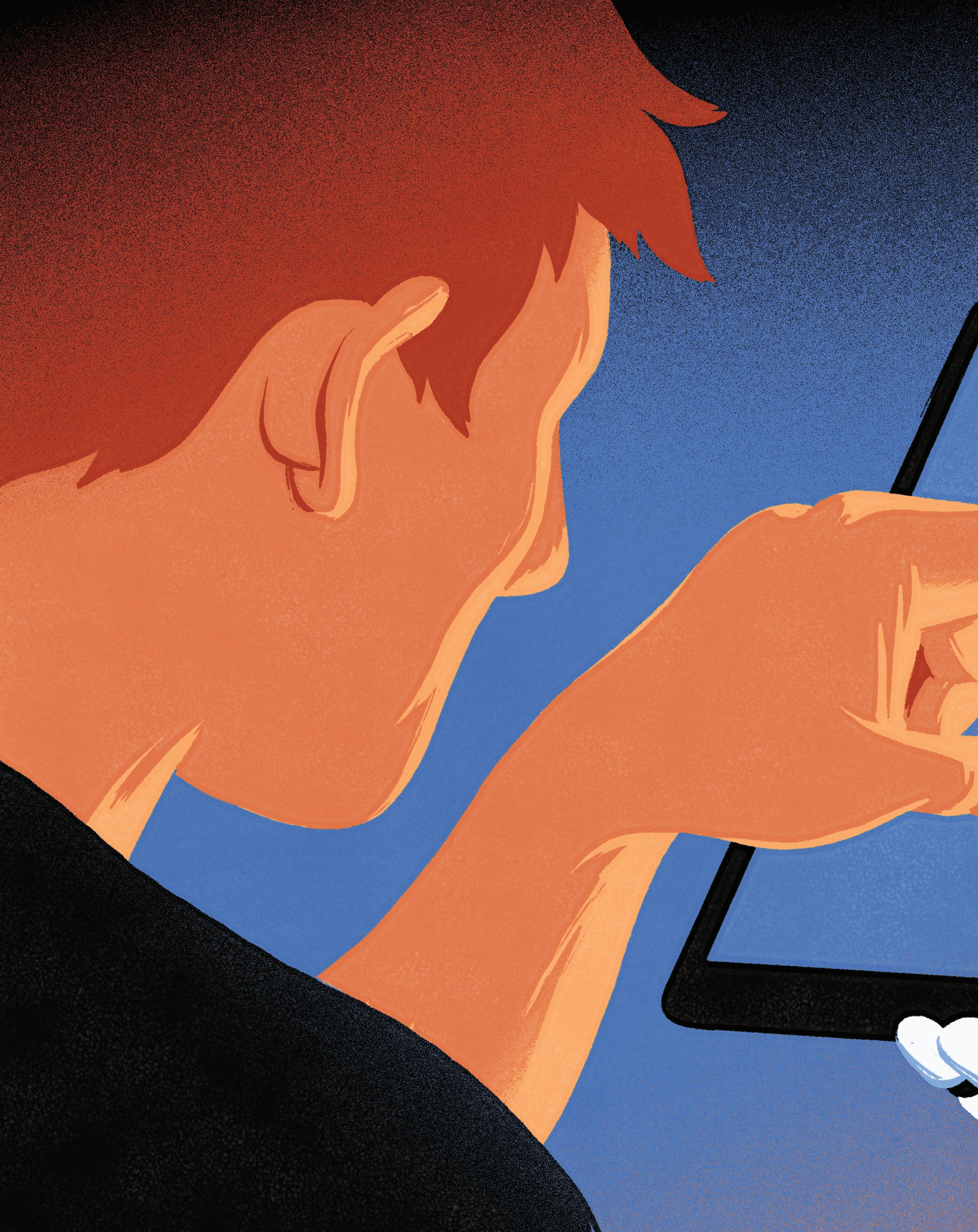

As AI continues to develop at a dizzying pace, Johnson & Wales is grappling with its promise and perils and helping students thrive in a transformed learning landscape.
BY JUDY HILL ILLUSTRATIONS BY ALEX NABAUM
“Our students are joining a workforce that has AI enmeshed in it. To try to have them not interact with it at all does them a huge disservice.”
RECENTLY, salted caramel was on the agenda in CFIT Senior Instructor Tim Brown’s baking and pastry class. But instead of following a traditional recipe, his students fed a list of ingredients into an AI recipe generator and prompted it to create a method of prep.
“Cook the sugar,” read one of the steps in the resulting recipe. “What does that mean?” asked Brown, noting that the directions AI spit out in seconds also failed to stipulate that the cream should be heated before being added to the hot sugar. “That can be pretty dangerous if you don’t know what you’re doing,” says Brown, for whom this exercise highlights both the potential and pitfalls of artificial intelligence.
Since ChatGPT’s launch in late 2022, educators everywhere have been grappling with the implications of generative AI technology. Along with the host of other LLMs (large language models) that have since sprung up, ChatGPT can make short work of any number of previously labor-intensive tasks. Type in a prompt and seconds later you’ll have a serviceable line of computer code, a song in the style of Taylor Swift, a term paper, a love poem or a business plan. For time-crunched students, the appeal is clear.
The promise of a shortcut has always been tempting, whether that’s having a friend write a paper, using Wikipedia for research or running an essay through an editing app like Grammarly. AI is hardly new in our lives, either. Any time we use a navigation app or talk to a customer support chatbot or engage with social media we are using AI, whether we know it or not.
What makes generative AI such a powerful game changer for higher ed is its sheer ease of use. Students can now cut and paste assignments directly into an AI tool and produce finished homework with negligible cognitive input.
“It’s just a different world,” says Kristin Pendergast, director of community standards and chair of the academic integrity committee. “For our students, AI is the future. We have to find a way to understand and embrace it and teach students how to use it in ethical, safe and responsible ways, since it’s not going away.”
Assistant Professor Ashley Smalls, Ph.D., who teaches communication skills and rhetoric, agrees. “Our students are joining a workforce that has AI enmeshed in it,” she says, “To try to have them not interact with it at all does them a huge disservice.” Generative AI skills are now part of job listings, adds Senior Instructional Designer Heather Myers. “In order to be competitive, you need to be able to use ChatGPT and DALL-E [a text-to-image model) and have some type of prompt engineering skill.”
of ChatGPT’s public debut, Johnson & Wales had adjusted its Academic Integrity Policy to address the use of generative AI, and in late 2023, a Generative AI Committee was launched to grapple with issues around teaching, policy, ethics and security. Composed of faculty and staff from around the university, the group continues to meet monthly. “We knew students were using this tool,” says Assistant Professor Diane Santurri, who teaches digital marketing and social media and is one of the faculty members on the committee. “So, it was a real push to get ahead and catch up with them and figure out training and best practices.”
To ramp up faculty’s understanding of AI, the committee hosted several generative AI professional development sessions, and this spring offered a digital badge and a series of workshops through the Center for Teaching and Learning that covered topics such as AI 101, prompt engineering,
security and ethics, and how to use AI to design lessons, create grading rubrics and carry out research.
The university’s overarching policy regarding generative AI is that it is not permitted without explicit permission from an instructor, and a student cannot use it in a way an instructor has not specified. Beyond that, JWU faculty have the freedom to use AI in ways that best support the courses they are teaching.
Working with the academic deans, University Provost Richard Wiscott, Ph.D., has charged faculty with three goals related to AI: identifying ways to integrate AI into the new university core curriculum through a course designed to provide students with foundational knowledge on the impact of use of AI in the future; integrating AI into required major classes to help students understand the impact of AI on specific industries they will be working in; and exploring creation of formal AI academic programs and certifications at the undergraduate and/or graduate level, specifically tied to majors such as computer science, cybersecurity and data analytics.
Some faculty have been embracing the technology from the get-go, with caveats. Cybersecurity Assistant Professor Anthony Chavis, for example, “highly encourages” AI use in his classes but requires that students record their prompts and include them in their assignments so he can see their train of thought.
As someone who teaches writing, English Professor Karen Shea, Ph.D., initially struggled with the ubiquity of AI but sees its value in unlocking writer’s block and kickstarting the creative process. The policy she has arrived at is flexible. “If you sit at your computer for a while and still feel stressed or unable to proceed with your writing,” she tells her students, “AI can be helpful, as long as you’re transparent about if and how you use it at any stage of the writing process.”
IN JWU CLASSROOMS across campus, faculty have been finding innovative ways to engage their students around AI.
Associate Professor Adam Hartman, Ph.D., who teaches math and physics, has his students prompt AI to write code to describe a simple pendulum. He then asks them to identify errors in the code as a way of testing whether they understand the physics.
Students in the Design Department also use AI to write code, this time for website design. Taking away some of the legwork frees them up to focus on user experience, says Design Department Chair and Associate Professor Deana Marzocchi. Students can also get a quick read on a specific demographic by asking AI a question like, “What type of color palette and font would appeal to an audience between the ages of 50 and 70?”
Tasked with developing casual restaurant concepts, students in Associate Professor Michael Makuch’s culinary classes have been using AI to research and analyze demographic trends to decide, for example, whether they should opt for a brick-and-mortar restaurant, a food truck or a ghost kitchen.
For an experiential class making a podcast for the Providence Tourist Board, Bryan Lavin, an associate professor in the College of Hospitality Management, showed his students how they could use AI to analyze the podcast and create 45-second social media clips, making a laborious task manageable while preserving their creative input.
With Professor Kristen Regine, DBA, Myers designed an online influencer marketing course where students used AI to practice their interviewing skills. After receiving a prompt, the AI tool acted like an influencer responding to a job posting. The students went through an interview process with the AI and then downloaded the conversation into a Word doc to submit as their assignment.
Communications professor Smalls has also used generative AI to make her class more interactive. After downloading her lesson content into ChatGPT she created a simulation game in which her students are tasked with running a workforce and have to decide what
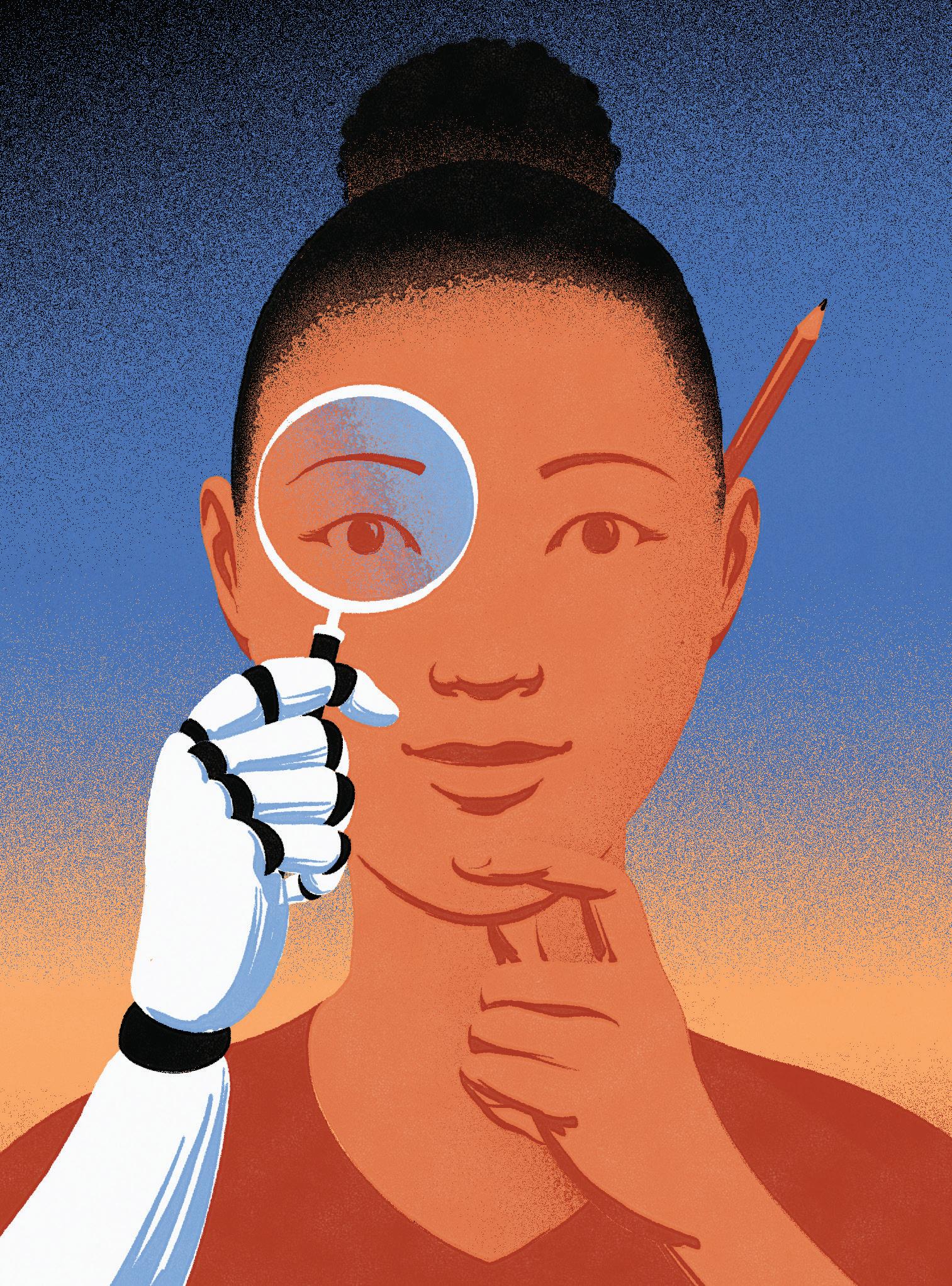
“These tools are pretty voiceless, so we want students to still understand the writing process, to work through and develop their own voice, their own opinions.”
communication methods to use at each step. Throughout the game, ChatGPT tests their knowledge of concepts they have learned in class.
To better prepare her students for future jobs or internships, Marketing Associate Professor Elizabeth Carey tweaked an earlier advertising class to include generative AI. “When someone talks about Leonardo AI or Midjourney or Canva Magic AI,” she says, “they’ll be able to say, ‘I’ve tried Leonardo, and here are some of the things it doesn’t do well, but we can still use it as inspiration to let the creative team know this is our conceptual vision for this campaign.’”
MADISON MCCREA ’26, a business administration major in Carey’s class, says using AI is always a process of trial and error. “It never gets it right the first time. It’s more like the third or the fourth and after I’ve been more specific with the prompt or just straight up told it, ‘This is not what I wanted. Redo it.’”
Anthony Chavis, who uses AI widely in his classes for threat modeling and forecasting, starts each semester telling his cybersecurity students, “It’s just a tool. It’s not perfect. It makes mistakes. You need to double check, sometimes triple check, your work.”
For one assignment, he asks his students to create a project management plan using ChatGPT and then to complete the same task by hand. The point, he says, is to show them what AI still lacks. “ChatGPT can give you a good skeleton,” he says, “but you still need the muscles and the tendons and the blood vessels. You’ve got to put all that in there.”
As well as being prone to misinformation, AI is plagued with bias. In one of the GenAI committee’s workshops, participants were asked to identify the bias in a series of AI-generated images. The tool had been asked, “What does a professor look like?” Its answer: white, male, mid40s, glasses. Carey shows this example to her marketing students to help them understand that “just because this is new technology doesn’t mean it’s working well.”
And since it’s now impossible to do a Google search without seeing an AI-generated overview, Carey tells her students to “scan it, but don’t forget there are all these links beneath to scholarly articles and periodicals.” Olivia Loubriel ’28, an exercise and sports science major, has noticed that many of her fellow students “go right to AI” instead of doing an internet search. “I think it’s a little scary,” she says, “because with a proper search you can easily find a reliable source.”
While JWU junior McCrea says she and her fellow classmates use AI to help brainstorm and come up with ideas, “we then develop our own opinion and put our own spin on the project.” That individual viewpoint, which AI lacks, will always be powerful, insists Pendergast. “These tools are pretty voiceless, so we want our students to still understand the writing process, to work through and develop their own voice, their own opinions.”
And as much as we anthropomorphize it, AI is not sentient. Its limitations are clear if you’re coming up with new flavor combinations, for example, says Chef Makuch, because it cannot experience taste. Part of his role, he says, is to make sure his students “really sit with the information they’re getting from AI and see if it makes sense. The basics and fundamentals don’t change and our students’ understanding of cooking is more important now than ever.”
One of the less discussed downsides of AI is its impact on the environment. Loubriel thinks many people are simply not aware of the energy resources AI’s data centers consume and the greenhouse gases they emit. “My generation is constantly talking about trying to help the environment,” she says. “We’re using paper straws, but on the other hand, if you’re ChatGPTing your homework, how is that helping?”
AS WELL AS NURTURING their students’ critical thinking skills in a world transformed by AI, faculty are also heeding the call to adapt their teaching methods. “If AI can do the assignment,” says Myers, “maybe the assignment needs to change.”
Because they have such a strong hands-on component, classes in the culinary and health and wellness areas already lean into experiential learning more than written research papers. And academic disciplines such as graphic design continue to emphasize the individual creative process, with students required to produce sketches and mood boards and work through multiple iterations in person during studio time so the faculty can see their designs developing.
For students in business and the humanities, the idea of coming to class to absorb information delivered in a lecture is fast disappearing, says hospitality professor Lavin. “If the lecture wasn’t already dead, it’s on its way out because students can easily use ChatGPT to synthesize a chapter into digestible notes.”
To make the most of class time, he uses a workshop-based approach where students get the information they need outside of class and then meet as a group to learn how to apply and use it in their future careers. “That’s where JWU is uniquely positioned,” he says, “because our faculty have been out in industry and walked the walk.”
AI holds great potential to create customized learning experiences says James Griffin, Ed.D., a professor in the Food and Beverage Department. With input from a student on how they like to learn, AI tools could “customize to their learning style and pace,” he says. In that scenario, the instructor would provide “that vital layer of human experience and wisdom and emotion that contextualizes and makes human the AI enhanced learning.”
Economics Professor Qingbin Wang, Ph.D., urges his students to adopt a mindset of continuous learning and build up their critical thinking and problem-solving skills to bolster their value in this new AI-inflected landscape. “Some people’s job will be more affected by the new technology than others,” he says, “but if you are prepared for the situation, I would say there’s no need to be pessimistic or to panic.”
With every round of industrial revolution—the steam engine, motor cars, computers and now AI—says Wang, people initially worried about losing their jobs. “What we actually found was that each new breakthrough in technology created new jobs, new industries and new product areas. Each time, we actually saw job creation outweigh job destruction.”
AI TOOLS CONTINUE TO EVOLVE at a dizzying speed— China’s DeepSeek is just one recent addition to the mix—and the technology is unlikely to slow down anytime soon.
“The amount that has happened with AI is extraordinary, and it’s changing all the time,” says English Professor Karen Shea. “Even if you get a handle on it, it’s not going to be the same six months, a year from now.”
Once a week, Chatbot Willie, an AI-powered texting tool, reaches out to undergraduate students at Johnson & Wales and asks them how they are feeling in four key areas: academic engagement, financial distress, wellness and engagement.
Based on their response, the chatbot can quickly send out links to referral resources or, if the student says something that indicates they are struggling, will send an alert to a team of staff members ready to take action and follow up in person.
“The benefit of the tool,” says Assistant Provost for Student Achievement Dameian Slocum ’00, ’21 Ed.D., “is that it enables us to reach very broadly across the student body, ask meaningful questions, get feedback and then respond in a very timely manner.”
The chatbot keeps a knowledge base of JWU resources and a history of its interactions with students, explains Communications Specialist Derek Lavoie, “so it’s able to synthesize information, keep relationships straight and have meaningful connections with students.”
With a 96% opt-in rate across the university and a 64% engagement rate, Chatbot Willie is clearly filling a need. “Students want to be heard and cared for and responded to, and this doesn’t feel new to them,” says Slocum. “This is the world they’re most familiar with.”
Slocum says he’s been able to share his experience with others on campus. “I tell them we’re already using AI, and students are interacting with it, and we’re okay and they’re okay, so let’s not be afraid of it, and let’s think about how to integrate it in a smart way.”
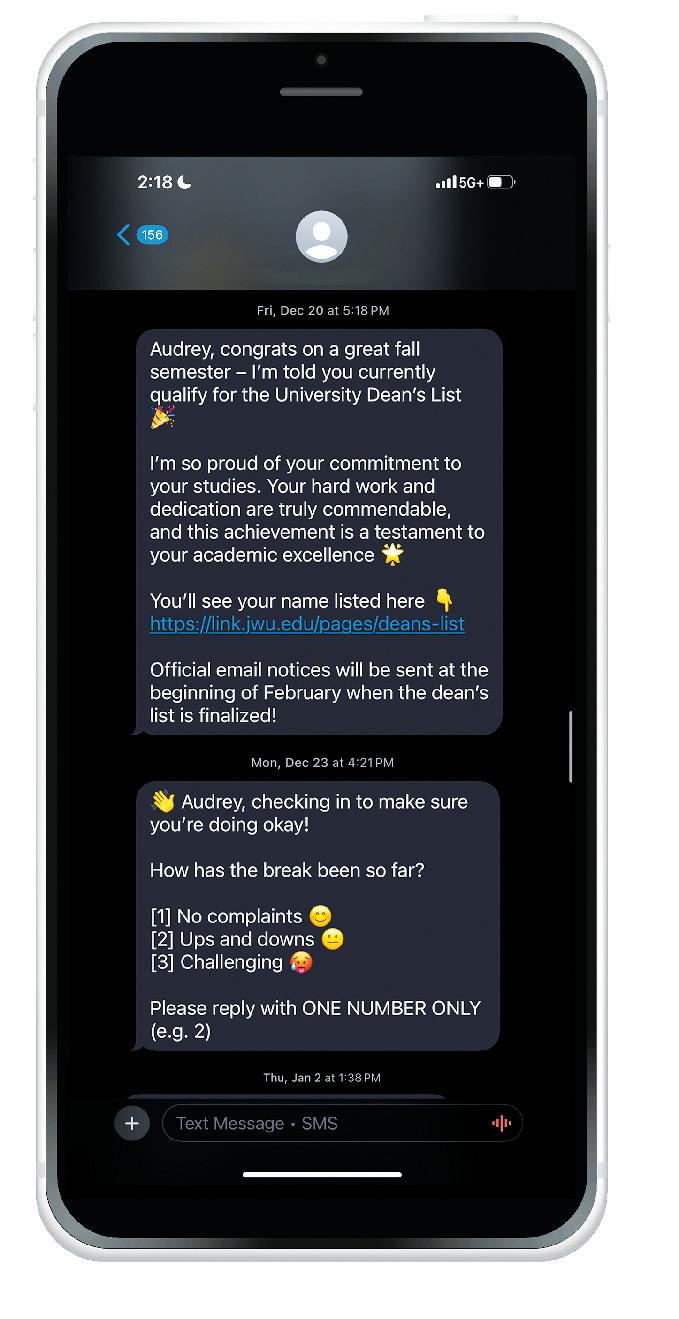
Marketing professor Carey tells students about her own experience dealing with a big disruptor in the mid ’90s—the internet—and advises them to “be adaptable and educate yourself.” Generative AI is moving at a much faster pace than what she witnessed then, she acknowledges, but the paradigm-shifting implications are similar.
“Gen AI is not going to replace you, but it’s also here to stay and you can’t ignore it. As a learning community, we need to embrace it.”
JWU
“Here’s the
Can you fix it?”
Through the Tiefel Project, students work with hospitality executives on real-world problems.
Before becoming a Tiefel Scholar, Alex Farmer ’25 knew precious little about wastewater treatment. After helping a hotel group on the Jersey Shore increase its sustainability practices, he now feels well versed in water recycling systems, as well as food waste reduction and composting solutions. More than that, he has a better overall understanding of what sustainability looks like in the hospitality industry and how it can best be achieved.
Farmer, who transferred to Johnson & Wales University as a junior, applied to be part of a Tiefel Project after seeing the “real-world impact” his fellow students had been able to have on the hospitality industry through the program.
The Tiefel Project is named for William (Bill) Tiefel ’98 Hon., a hospitality industry icon and long-time Marriott executive who has consistently championed hospitality education. In 2004, Tiefel sponsored the university’s first endowed professorial chair, through which JWU was able to bring industry partners directly into the classroom to interact with students. In 2018, Tiefel encouraged JWU to rethink The Tiefel Chair
to involve students directly in solving industry problems. The resulting Tiefel Project comprises one to three consulting projects a year that students (Tiefel Scholars) work on under the guidance of a faculty member (known as a Tiefel Fellow).
Sometimes the students work directly with an industry contact/sponsor who proposes a particular problem for the students to investigate and propose solutions. Other times, students carry out research on a broader issue within the industry issue.
To be considered as a Tiefel Scholar, students must submit a statement of interest describing why they want to work on a Tiefel Project (which counts as a three-credit class) and what they can contribute to the group.
“It’s nice to know in advance who’s good at what,” says Associate Professor of Hospitality Management Katie Davin. “Somebody might say, ‘I’m great at managing teams.’ And somebody else might say, ‘I’m a really good writer.’ And another student might be good at talking to professionals.”
The range of projects is wide. “Sometimes an organization will say, ‘We don’t have a problem, but we want to make improve-
ments,’” explains Davin. “Sometimes it’s an actual problem that they just don’t have the staff or the time to tackle. It’s been on their to-do list and now they’ve got a group of students with a lot of energy who can solve the problem or offer recommendations.”
This past semester, Interim Associate Dean of the College of Hospitality Management Jane Boyland served as Tiefel Fellow for a project that explored the impact of Marriott’s 2023 acquisition of the Hoteles City Express brand, which increased its presence in Mexico and Latin America.
As part of the project, Boyland and her students—who have worked closely with COHM advisory council member and former Marriott VP for Mexico Kevin Schwab ’82, ’21 MBA, ’14 Hon.—traveled to Mexico to experience firsthand an “international acquisition in action.”
This was a fantastic opportunity says Boyland, to “explore what it means to integrate brand and guest experience standards between cultures, with the added benefit of learning more about Latin American business and social customs.”
In another Tiefel Project this spring, Paul


Bagdan, Ph.D., a professor in the College of Hospitality Management, led a team that looked at Providence and Rhode Island as an accessible destination. The students visited restaurants, hotels and event venues to see how well they serve people with a variety of needs and limitations. After evaluating the venues through the lens of someone who is deaf or neurodiverse or in a wheelchair, for example, the students developed a card of best practices that can be given to each establishment and used in training.
“I think it’s something that benefits Rhode Island,” says Bagdan. “It benefits all of the businesses as well, because it makes us a more welcoming state. If they can make some small changes, then maybe they can accommodate more people with particular limitations or preferences.”
Sometimes, says Boyland, the projects have “lofty goals.” At other times, “they sound mundane but are still a really great experience for the students.”
In the latter category, a Tiefel Project led by Davin dove into the distinctly prosaic topic of laundry. The hotel with whom her group partnered outsourced their laundry, as many hotels do, rather than washing their own sheets and towels in their own laundry facility. Pre-COVID, the arrangement had worked well, but post-pandemic staffing problems had made the service unreliable,
with laundry deliveries arriving late and often stuffed into bags without being folded.
“The hotel said, ‘Can you help us figure out what to do about this?’” says Davin, who toured the laundry facility and hotel with her students as they researched possible solutions. “They did extensive research on costs and competition and other options, such as building an on-site laundry facility, and made recommendations, which the hotel really appreciated because it was something they hadn’t had time to do,” she says. “You wouldn’t think that sheets and towels and laundry equipment would be interesting, but the students really got into it because they were tackling an actual nutsand-bolts problem.”
For Farmer, the hospitality student who worked on sustainability in New Jersey, being a Tiefel Scholar felt different than his experiences as an intern.
“The Tiefel Project really was unique,” he says. “Typically, with an internship, it’s more of an entry level type of role and you don’t necessarily get to see the market research and the other side of things. Being trusted with all of the research that we did, with very little direction from the Asbury Collection, it felt more as if they were a client, and they were reaching out to us for help rather than them just teaching us the business.” —
JUDY HILL

JOIN US. MAKE A DIFFERENCE.
When you join the Epicurean Scholarship Society you become part of a distinguished group of philanthropists providing support to hard working JWU students who will become leaders in their industry.
Learn more:
“The members of our Epicurean Society support JWU’s highest priority—student success.”
— Mim L. Runey, LP.D., Chancellor
Austin Scoles ’18 likes a challenge. After graduating from the Charlotte Campus almost a decade ago with a B.S. degree in Baking & Pastry and Food Service Management, Scoles plied his skills as a pastry chef at private clubs in Florida and Texas before returning to become an instructor at his alma mater, where he also recently completed a master’s degree in hospitality administration.
Now, the 28-year-old baker and pastry chef is “99% sure” that he’s the youngest person to ever receive the title of Certified Master Baker from the Retail Bakers of America association. As of 2019, there were fewer than 200 Certified Master Bakers in the United States.
“It was a lot of fun,” says Scoles of the process, which included a 200-question written exam and a two-day-long practical test covering a wide variety of pastries and baked goods. “For me, this was a personal challenge, and I knew it would make me a better educator and chef.”
Preparation for the February 2025 test began for Scoles six months earlier when he invited his Foundations of Baking & Pastry students to stay after labs and help him practice. A small group, he says, came in every weekend to work with him and stayed at his side for support during the two-day exam. “I involved my students to show them that growth comes from pushing beyond comfort zones,” says Scoles.
Nothing on the test was “really outrageous or complicated,” says Scoles, though it covered everything from cakes to croissants to baguettes to challah, as well as two “surprise” items—pretzels and biscotti. Day one was smooth sailing. Day two—when one test involved cutting and icing a cake in six minutes—was more of a challenge.
“As soon as I did my speed test, I looked at it and wasn’t happy with it,” says Scoles. “The hardest thing was getting past that, turning in the cake and saying, ‘Okay, I still have other things to do that I need to do at a really high level. How can I persevere and push through?’”
Scoles wasn’t the only one being assessed by the three RBA judges who had traveled to the Charlotte Campus for the practical test. Fellow Wildcat Cody Middleton ’17, who Scoles had worked with at the Polo Club in Boca Raton, decided to join in on the fun.
“We both practiced every weekend—him in Myrtle Beach and me in Charlotte—and we had these long debriefs on the phone.” Going through the preparation with someone he had a connection with was “really awesome” says Scoles. Both bakers passed the test. Bravo Wildcats! —
JUDY HILL


By Maggie Mulvena Pearson ’13 (Countryman Press)
Pearson founded her gourmet meal delivery company, Feast & Fettle, in 2016 with 27 clients in and around Providence and the East Bay. Today, the company has 250 employees and 60 vans and delivers locally prepared meals across seven states in the Northeast. In her first cookbook, Pearson shares the recipes for some of those meals and adds new dishes to the mix.
ALSO RECENTLY PUBLISHED BY JWU ALUMS:
THE SAGA OF HENRI STANDING BEAR: A RESCUE STORY
By Kendra Loring ’94
Loring, who is the owner of Enchanted Equine Adventures in Albuquerque, New Mexico, recently published her first children’s book. Inspired by Henri, one of her therapy horses who overcame a traumatic injury, the book highlights her mission to give horses a new purpose.

TO THE WORLD
By Eric Adjepong ’10 (Clarkson Potter)
In his debut cookbook, “Top Chef” finalist Eric Adjepong shares 100 West African-influenced recipes, along with essays about his journey to understand his personal and culinary identity as a first-generation Ghanaian American. The book includes both traditional recipes—like his mother’s flavorful jollof rice—and his own creations, such as sweet summer curried corn bisque and sticky tamarind-glazed duck legs.

By Luann Akaydin ’04
“Monkey and Cloud” is an exploration adventure told through a story of helping. Monkey helps the lost Cloud to find their family and has many wonderful experiences along the journey. “One of the things that I really hope people will understand is the beauty in diversity,” says Akaydin.
Jason Bouchard ’02
Bouchard shares his personal journey through grief—his mother passed away from cancer in 2021—and highlights the importance of mental health. His book aims to provide hope and support to others struggling with grief.
If you are a JWU alum who has recently published a book, we’d love to hear about it. Send a note to alumni@jwu.edu.
Thirty alumni, along with partners and friends, traveled to Rome and Florence in February for the JWU Alumni Winter/Spring Study Abroad Program. Standout activities in Rome included guided tours of the Colosseum, Roman Forum and Palatine Hill. The journey continued in Florence, where the group partnered with Florence University of the Arts for classroom workshops and hands-on cooking and wine appreciation classes, and to Chianti, for a private tour of the Castle of Verrazzano in the town of Greve in Chianti.
“I never would have experienced Florence and all of its tasty flavors if it wasn’t for Johnson & Wales,” says Andrea Hernandez ’01. Donald J. Poulin ’87, who celebrated his 30th wedding anniversary with his wife while on the trip, said it was an unforgettable experience. “As an alum, I was excited to reconnect with the university while exploring new cultures, learning outside of a classroom, and making lasting memories with fellow alumni.”

THE 2025 DISTINGUISHED ALUMNI AWARDS, which were announced during Reunion Weekend in early April, recognized three exceptional alumni who have made noteworthy contributions in their respective fields and to JWU, and have demonstrated remarkable dedication, hard work and perseverance, inspiring others through their achievements.
Awards were made in three categories.

Outstanding Achievement Award
This award recognizes an alum who has made significant impacts in their field and is an outstanding role model for fellow alumni, students and the JWU community. President Bernardo-Sousa has been a steadfast and compassionate presence for our students and alumni in a variety of roles for more than 35 years. As well as serving the university tirelessly, she has also contributed to the field of higher education and the Providence and Rhode Island community through her work on numerous boards. Bernardo-Sousa has announced that she will retire from the university at the end of August.
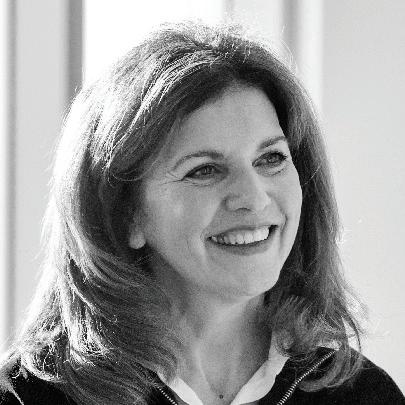
WHO: Francesca Corsinetti ’23 is an occupational therapist and former college athlete who is using her life experiences and education—and her passion for sports—to address the stigma that still exists around mental health for athletes.
WHAT: Three years ago, she launched The Sports OT, a holistic occupational therapy practice based in Rhode Island that helps current and former athletes manage all aspects of their mental health. “We build a treatment plan together,” says Corsinetti of the clients she works with in both individual and group sessions. “We look at any barriers that they might be facing, whether that’s managing their goals and routine, depression, anxiety, dealing with injuries or sustaining an identity.”
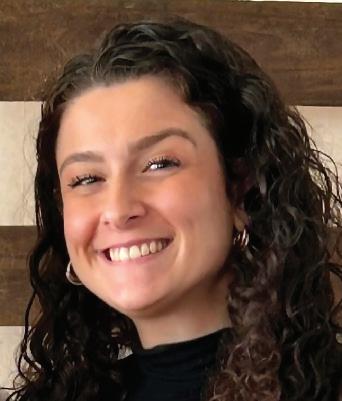
WHY: Frequently, says Corsinetti, when a person retires from a sport or becomes injured, they start to question their identity. “This sport was their whole life. What are they supposed to do now?” she says. “I can help them figure out who they are as a person and what other things interest them and how to improve their life even though they’re not engaging in their sport anymore.”
WHAT ELSE? The Sports OT and Corsinetti’s “day job” as a hand therapist take up much of her time, but she is still an athlete at heart. “Basketball has been a part of my life since I was three years old,” she says, “and it’s something I can’t imagine living without.” Though she is retired from playing, she stays in the game by coaching high school girls basketball. “Those girls are my whole life,” says Corsinetti. “They trust me enough to confide in me with anything and I’m able to connect with them in ways the male coaches can’t, which helps them both on and off the court.”
This award recognizes an active and engaged alum who has made significant contributions to enhancing the JWU alumni community. Barry, who is CEO at Appcues, a leader in user engagement technology, supports the JWU alumni effort and consistently demonstrates his commitment to fostering the next generation of graduates from the College of Business by returning to the classroom to inspire students. He has also played a significant role in hiring graduates for important positions within his organization, contributing to their professional development and success.
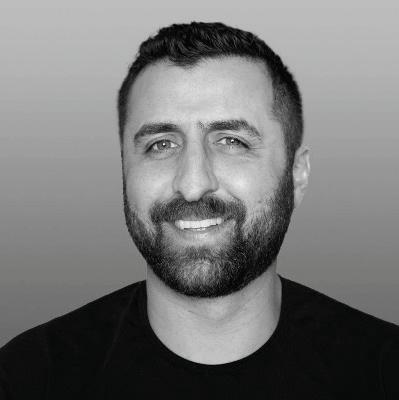

This award recognizes an outstanding alum with a rising career who has made notable contributions to their field and is actively engaged in the JWU community. Choi is the owner and president of BKCHOI Inc., which owns PVD Noodle Bar, Chicken Story, Hankook Beverage and Sott. By actively engaging with students, taking the time to share his experiences and insights and offer guidance and support, he has played a vital role in fostering student success and encouraging academic and personal development.

1975
JOSEPH A. DESIMONE JR. PHILADELPHIA, PENNSYLVANIA
Joseph is a real estate consultant in the Philadelphia area.
ROBERT J. GOLDSHER HOLBROOK, NEW YORK
Robert is an entrepreneur and is currently the managing partner for VacuVorteX in Holbrook, NY.
1985
ANTHONY S. KASZUBA HAZLET, NEW JERSEY
Anthony was the recipient of the SHFM (Society for Hospitality & Foodservice Management) Jay B. Silverstein Lifetime Achievement Award.
1988
PHIL MUCCIARONE WESTFIELD, MASSACHUSETTS
Philip has retired after 34 years as a chef instructor at Westfield Technical Academy in Westfield.
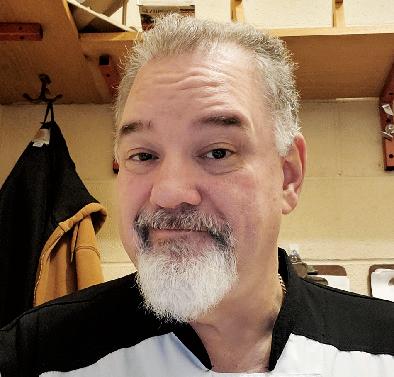
JAY S. COHEN
CULPEPER, VIRGINIA
Jay is a culinary teacher for Culpeper County Schools at The Culpeper Technical Education Center in Culpeper. Jay achieved FCCLA Master Advisor and was voted Teacher of The Year.
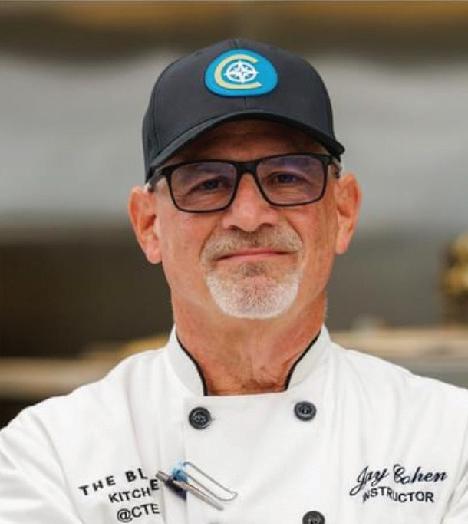
EDMUND J. BRYLCZYK
WOBURN, MASSACHUSETTS
On November 4, 2024, Ed was inducted into the invitation-only New England Chapter of the Les Amis d ‘Escoffier Society. Ed has served in multiple capacities at Dole & Bailey for 30 years, currently as the corporate chef and general manager, bringing his culinary passion and expertise to the D&B team and its over 2,000 customers. He has served as a featured chef at the Nantucket Food & Wine Festival, Newport Food & Wine, the 50th Anniversary dinner at Johnson & Wales University and is a regular guest lecturer at JWU.

KATRINA E. WARNER ’96 M.S.
ARLINGTON, TEXAS
Katrina is a coordinator/instructor of culinary arts at Tarrant County College in Arlington. Katrina recently won the ACF National Chef Educator of the Year award at the ACF National in Phoenix.
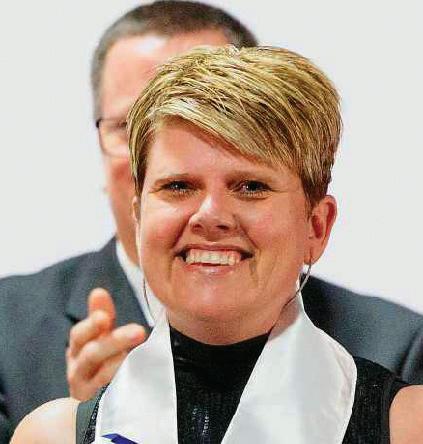
ROBERT R. BLASI, PHR
MIAMI, FLORIDA
Robert has been named partner and chief people officer of Riviera Dining Group in Miami.
KRISTOFER JUBINVILLE
ESTERO, FLORIDA
Kristofer has been honored with the prestigious “Chef of the Year” and “Meeting of the Year” awards for 2024 by the American Culinary Federation Caxambas Chapter. Kristofer is currently the executive chef at Spring Run Golf Club in Estero, and credits his education at Johnson & Wales University as the foundation for his success. He remains committed to inspiring the next generation of chefs and advancing the culinary arts.
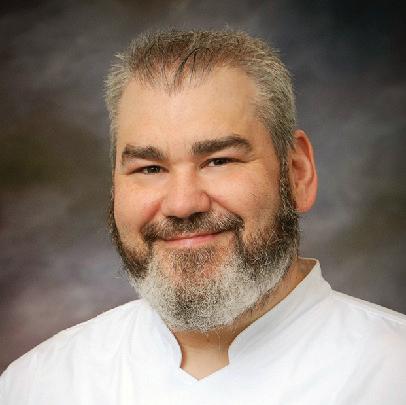
ANDREW M. POLIQUIN
OKEECHOBEE, FLORIDA
Andrew is the director of food & beverage at the Seminole Casino Brighton Bay on the Brighton Seminole Reservation in Florida.
DARRYL E. HOWARD MURRIETA, CALIFORNIA
Darryl was appointed CEO of Canine Support Teams, Inc. in Murrieta, in July of 2024.
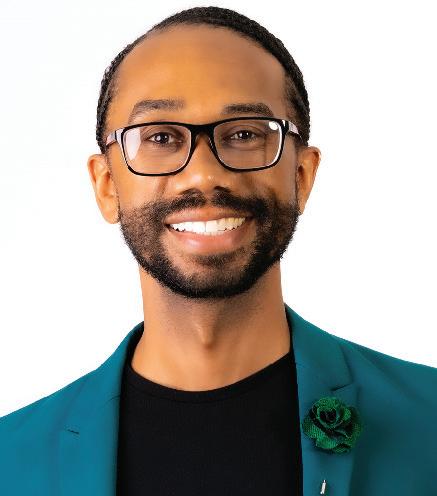
TIFFANY S. BOOKER
MONTCLAIR, NEW JERSEY
Tiffany has obtained her broker’s license and is a broker associate at Prominent Properties Sotheby’s International Realty in Montclair.
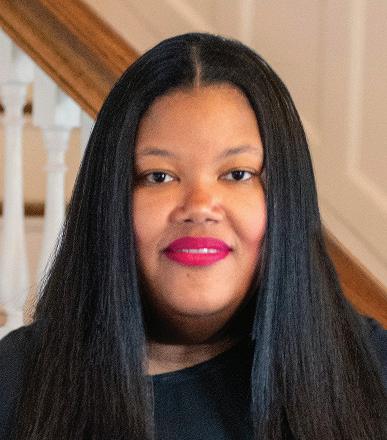
DANIEL E. BERGIN
DEER PARK, NEW YORK
Daniel placed first in the 2024 World Ice Art Championship, Single Block Classic in Fairbanks, Alaska. The competition took place in February/ March 2024. Placing first qualifies Daniel for the ice sculpture competition part of the Cultural Olympics during the next Winter
Olympic games in Milan, Italy in 2026. Daniel is the ice carving manager with Apple Ice in Deer Park.

CATHERINE A. LEARY
WORCESTER, MASSACHUSETTS
Catherine has joined Worcester Polytechnic Institute in Worcester, as director of development, major gift officer.
DANIEL R. PUGLISI
ATLANTA, GEORGIA
Dan is the SVP of corporate operations for the newly launched restaurant management division of Peachtree Group in Atlanta.
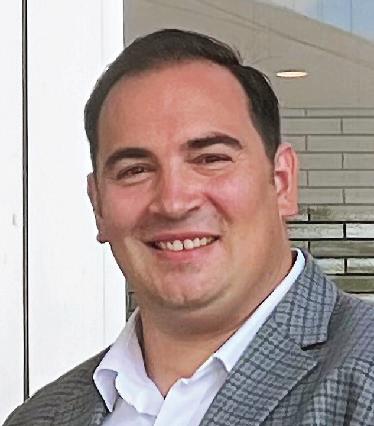
2010
AMANDA MONTGOMERY
WARRENSBURG, MISSOURI
Amanda received a Master of Business Administration from the University of Central Missouri in December 2024.
ELIZABETH F. SCHWENK ’18
MBA
WOODSTOCK, VERMONT
Liz is celebrating her fifth year of ownership of The Prince and the Pauper restaurant in Woodstock. The fine dining restaurant celebrated its 50th anniversary in July 2024.

TREVOR J. DANEKER
PROVIDENCE, RHODE ISLAND
Trevor has started a new career as an environmental health food inspector for the Rhode Island Department of Health in Providence.

PAULINA CENTENO
SCOTTSDALE, ARIZONA
Paulina is the private events and hospitality coordinator at the Frank Lloyd Wright Foundation at Taliesin West in Scottsdale.
LYNLEY M. CONNOR
SAN DIEGO, CALIFORNIA
Lynley is the CEO of TopNotch Catering in San Diego, and co-founder of Breaducation, a nutrition focused baking company, in Los Angeles.
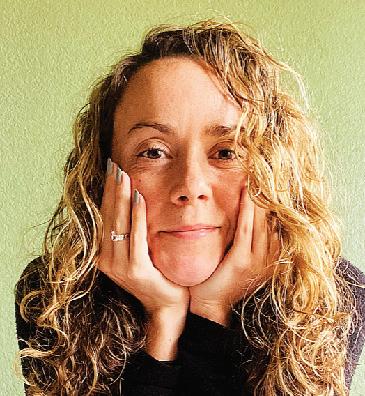
GIAN GENTILE
NORTH PROVIDENCE, RHODE ISLAND
Gian won the Providence Business News 40 Under Forty award and is the CEO of SecurityRI.com. The company was awarded both the Fastest Growing Company in the category of $2.5 Million to $15 Million (Top 6) and Innovation Winner in the Professional Services category from Providence Business News in 2024.
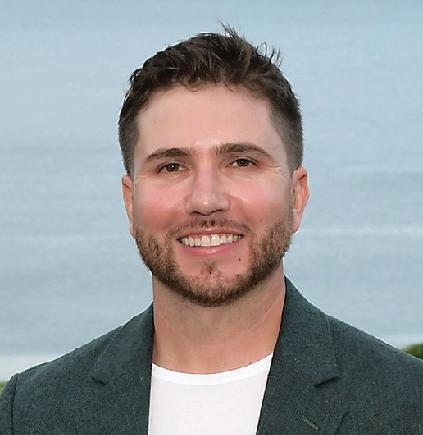
MICHAELA R. RUFFINO
MIDDLETON, MASSACHUSETTS
Michaela is the co-owner and managing director of Landmark Educational Tours based in Middleton. Michaela is “excited to give back by creating opportunities for JWU students to gain hands-on experience and insight into the travel industry through our educational travel programs. It’s an honor to share my journey and help the next generation of professionals grow in this exciting field!”

ALEXIS CISNEROS
PHOENIX, ARIZONA
Alexis won his first Emmy for a piece he did while at KOAT-NBC in Albuquerque. He currently works as a photojournalist for KPNX-TV in Phoenix.
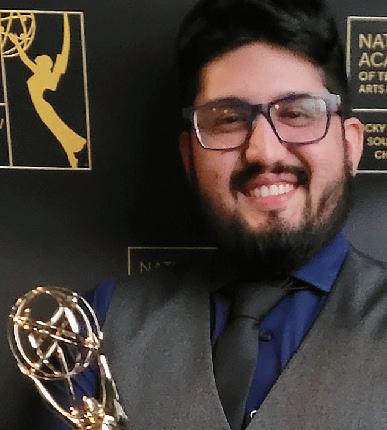
We invite you to share news about what's happening in your career and life with your fellow alumni.
Send your Class Notes news in an email to alumni@jwu.edu or submit the form at bit.ly/jwuclassnotes
Images: Please provide high-resolution digital files (minimum 1 MB in size) in jpg format.
LESLIE ANN HALLS ’24 M.S.
SAINT LUCIA
Chef Halls was recently hired as chef de partie at the Coconut Bay Beach Resort & Spa in Saint Lucia.
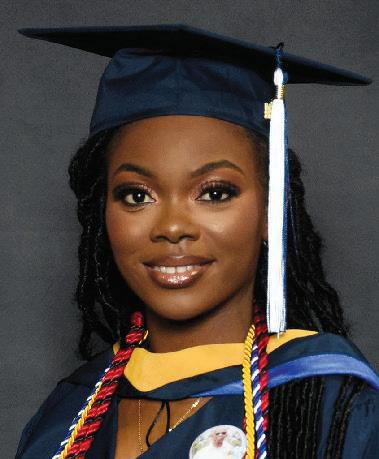
GIBRAN A. KAFAL
HARWICH, MASSACHUSETTS
Gibran is the F&B guest relations manager at Wequassett Resort and Golf Club in Harwich, and has been named one of 2024 30 under 30 for Hotel Management Magazine

JACOB T. OLSEN
PROVIDENCE, RHODE ISLAND
Jacob is the assistant director of college events & conference services in the Division of College Events Management and Planning at Providence College in Providence.
GABRIELLE & EDUARDO
PERDOMO
BAYONNE, NEW JERSEY
EveElyse Marie Perdomo
November 19, 2024

MAX & MEGAN LEEPSON
STRATHAM, NEW HAMPSHIRE
Lettie Leepson – October 28, 2024
KAITLIN QUIGLEY & CONNOR ZINGALES
NASHUA, NEW HAMPSHIRE
September 23, 2021

NATALIE FALATO & MICHAEL VALVERDE
NEWPORT, RHODE ISLAND
November 3, 2023
PAIGE ZUBER & MICHAEL
WEISHAUS ’22 M.S.
PROVIDENCE, RHODE ISLAND
September 28, 2024



culinary alums Ashley Moore ’07 and Dan Zuccarello ’07 returned to campus on February 4 to talk about their careers in food media. As part of the RATIONAL FIT Speaker Series, Moore and Zuccarello, who both work for multimedia cooking giant America’s Test Kitchen (ATK), talked about the zigs and zags of their career paths and their current roles at ATK.
Familiar to many as the host of "Today’s Special" and an on-screen test cook for "Cook’s Country," Moore is also a food stylist for ATK. As she shared with the Providence Harborside Campus audience, she started out with very different dreams, earning a B.F.A. degree in acting before realizing that she wanted to be on a cooking show. “I decided to go to culinary school and had my eye on the prize of getting to the Food Network no matter what it took.” After doing just that and working in New York City with Emeril Lagasse and Bobby Flay, Moore found her way to ATK. Zuccarello, now executive food editor for cookbooks at ATK—where he and his
team produce at least four books and 300 recipes annually—began his post-JWU career as a chef in Providence. The restaurant scene “didn’t exactly click” for him, and a friend in publishing turned his attention to ATK, where he started out as a recipe developer. The role has been a good fit, he said, allowing him to “be creative, problem-solve and create something to be proud of in a variety of publications.”
Taking the audience of JWU culinary students through the 12-step recipe development roadmap ATK undertakes for each new recipe, Zuccarello stressed the rigor involved in a process that is laser focused on guaranteeing success for the home cook.
“You have to have a thick skin to be a recipe developer at ATK,” said Zuccarello, “because this is an environment where feedback is our day-to-day. We’re going to say some tough things. We’re going to tear apart a recipe and build it back up.”
Food styling for photography requires equally close attention, explained
Moore. “We want to make the food look gorgeous, but at the same time it has to accurately depict the recipe and what home cooks should expect when they cook it.”
Moore clearly finds the work rewarding. Showing the audience a photo of an eggs Benedict dish she styled, she noted the “beautiful, beautiful—almost as priceless as a cheese pull—egg yolk drip.” Getting the yolk to drip out like that, she said, is an art. “The timing has to work really well.”
Both Moore and Zuccarello noted that during their time at Johnson & Wales they had been largely unaware of careers in food media. “There are so many opportunities for you in this sector of the industry,” said Zuccarello, including recipe development, food styling, social media and storytelling. “Where there is a need, there is a demand and there is a huge audience of people who are hungry for quality food content. All of you already are developing the skills and know-how you need to be successful in this industry.” — JUDY HILL
ALUMNI
1958
HOPE N. LANDRY
September 3, 2024
1973
BERNARD ALLAIN
November 18, 2024
1974
RAY GESICK
January 25, 2025
1975
DAVID V. CROCKER
August 8, 2024
JAMES R. MCCAUGHEY
October 10, 2024
1976
FRANCIS P. COSTELLO JR.
January 12, 2025
STEVEN W. GRUND
August 27, 2024
EDWARD LAVALLEE
July 31, 2024
ALBERT MARTINELLI JR.
January 7, 2025
1977
JAMES CRAGG
February 8, 2024
1978
JAMES R. CROZIER III
August 21, 2024
RICHARD J. MONIZ
August 16, 2024
THOMAS E. RAGOSTA
October 1, 2024
DAVID TOWNE
June 21, 2023
1979
RICHARD P. ARCHAMBAULT
August 23, 2024
EDWARD O. FOSTER
August 26, 2024
PHILIP J. NEWCOMB
December 27, 2024
1980
EDWARD F. HIGGINS
October 17, 2024
ROBERT PEIDEIA October 24, 2024
DAVID F. SMITH
August 27, 2024
DOUGLAS A. SOARES
January 8, 2025
WILLIAM D. YOUNG
September 24, 2024
1981
VINCENT CICCARELLI
August 6, 2024
ROBERT D. CLOXTON
July 2, 2024
GARY B. LEBOWITZ
August 1, 2024
DANA W. NELSON
January 19, 2025
1982
DEBORAH A. BROUILLARD
August 31, 2024
JOHN M. YUSZCHAK
July 19, 2024
1983
PATRICIA A. ARONOFF
October 1, 2024
RAINER W. WOLANSKY
August 10, 2024
1984
GREGG LANPHEAR
September 6, 2024
1985
MICHAEL DUTSCH
November 7, 2024
1986
I. TERRENCE THOMPSON
July 27, 2024
1987
JOHN P. MARINELLI JR.
October 18, 2024
BRIAN M. MILLER
August 1, 2024
1988
WALLY AMOS ’88 HON.
August 13, 2024
RICHARD (RUSTY) S. FALKOWSKI
September 25, 2024
JEROME P. PIE
August 6, 2024
1989
MARIO BARONE III
December 10, 2016
1990
ALLEN R. HAWK
December 29, 2024
TAMMY M. JAXTHEIMER
December 12, 2024
MARK L. MURPHY
December 3, 2024
WILLIAM A. PROBST
August 21, 2024
1991
WILLIAM P. EDMONDSON III
August 12, 2024
ELIO T. MATAN
September 30, 2024
1992
TIMOTHY P. HICKOK
January 16, 2025
PAMELA C. LOHR
October 12, 2024
STEVEN E. TEMPEL
March 21, 2022
STEPHEN H. TODD
January 17, 2025
LINWOOD T. WHITE
September 4, 2017
1993
COLLEEN S. HAYES
July 30, 2024
BRAD KELLY
January 6, 2025
TOBY LENT
October 7, 2024
JOHN D. MCKELVEY JR.
December 2, 2024
1994
ALAN S. FEINSTEIN ’94 HON.
September 7, 2024
DAVID S. OSBORNE
December 11, 2024
BRET A. SCOTT
November 7, 2024
1995
ANDREW S. CHU
March 11, 2021
BRUCE A. FRIESWICK
January 9, 2025
1996
LESLIE L. BARTOSH
January 30, 2025
SARI R. SEAGO
December 31, 2024
MICHAEL W. ZARZYCKI
December 30, 2024
1997
PATRICIA ADAMS
January 8, 2025
CHRISTOPHER S. PACK
January 11, 2025
KATHRYN A. SCHACKLIN ’02
MBA
December 30, 2024
1998
MONIKA “CHAZ” STEVENOR
September 1, 2024
2000
JEFFREY TABER
July 28, 2024
2002
CHRISTOPHER BRESLIN
July 30, 2024
SETH FEIBELMAN
August 13, 2024
TROY HOGUE
October 11, 2024
SCOTT THIBEAULT
January 14, 2025
2003
MICHEL J. GILBERT ’05 MBA
November 8, 2024
2004
REMY E. AULL
October 16, 2024
TANNOCCUS PATTERSON
December 26, 2024
2005
TARA BLACKMAN ’05 MBA
January 16, 2025
2007
JONATHAN D. ADAMS
August 18, 2024
2008
STEVEN M. ELLIOTT
October 14, 2024
2010
FRANK PAONE ’10 HON.
November 26, 2024
MICHAEL R. RAMOS
January 19, 2025
2011
IAN W. MARGOLIN
July 24, 2024
EDWARD D. SCHOLZ
October 12, 2024
2012
SCOTT A. BRUNO
May 9, 2024
FACULTY, STAFF AND FRIENDS
ANTHONY J. CHAMBERS
January 6, 2025
MICHAEL D’AMARA
September 19, 2024
MICHAEL GOLDMANN
November 26, 2024
ED QUINLAN
January 9, 2025
BRENDA J. ROCHA
December 20, 2024
Welcoming a flock of chickens to campus brings learning out of the classroom and into the coop.
LAST FALL, the Harborside Campus welcomed some new residents. A whole flock of them to be precise. The 19 sharp-beaked, scaly toed, sometimes raucous newcomers set up home in a brand-new chicken coop— dubbed by students the Coop-a-Cabana— built by university staff and students as part of a collaboration between the College of Food Innovation & Technology and the College of Arts & Science’s Animal Science program..
Hatched on a nearby farm over the summer, the Rhode Island Red, Plymouth Rock and
Black Star hens were chosen for their hardy nature and ability to endure New England’s harsh winters. Bringing them to the Harborside Campus, says Associate Professor and Animal Sciences Chair Jackie Bowser, Ph.D., offered a unique opportunity to explore the “natural synergy between sustainable food systems and animal science.”
Students from both academic areas are responsible for taking care of the birds. “They have to collaborate and get on a schedule with each other,” says Russ Zito, an associate

professor in the College of Food Innovation and Technology. “They have to meet up before sundown, divide up the work and get the chores done.” That means feeding the hens, picking up the manure, raking out the coop, collecting the eggs and making sure all the hens look healthy.
“Adding the coop was a big thing for the Animal Science students,” says Hailey Sangillo ’26, “because it offered us a chance to do hands-on animal husbandry.”
Being involved in chicken chores raises the students’ problem-solving skills, too, says Assistant Professor of Animal Science Chris Holland, Ph.D., who recalls one particular chicken that became injured. “One of the students brought it to my attention and sent me pictures, and after a couple of days of intense TLC she recuperated.”
Animal Science major Simone Cournoyer ’26 (shown at left with a Rhode Island Red) says taking care of the chickens has taught her how enrichment can impact behavior. “Even simple things like adding different perches or scattering food in different ways can change how they move around and interact,” she says. “It’s also interesting to see how their personalities come out—some are bold and some are more hesitant.”
Having hens on campus can also teach valuable lessons about sustainability.
Students collect food scraps from the culinary labs and kitchens, explains Zito, “so we’re able to divert that stuff away from the landfill.”
The hens are also incorporated into animal training and behavior classes, as well as animal nutrition projects, such as one in which students designed a “chicken menu” garden of foraging plants. “The students can take all the concepts they’ve learned in class and then apply them and see how they actually work out,” says Holland.
And then there are the eggs. The chickens are currently averaging a dozen and a half a night, which are used in culinary classes, says Zito, “to study the difference in quality, color and functionality compared to our commercial eggs from the storeroom.”
For all their educational potential, the chickens also just make the students feel good. “We can get puppies on campus during midterms and finals,” says Holland, “but consistently caring for an animal and having that human-animal interaction is such a positive experience.”
— JUDY HILL
